Therapeutic Relationship in Nursing Research Paper 2022
VerifiedAdded on 2022/09/29
|19
|4810
|22
AI Summary
Contribute Materials
Your contribution can guide someone’s learning journey. Share your
documents today.
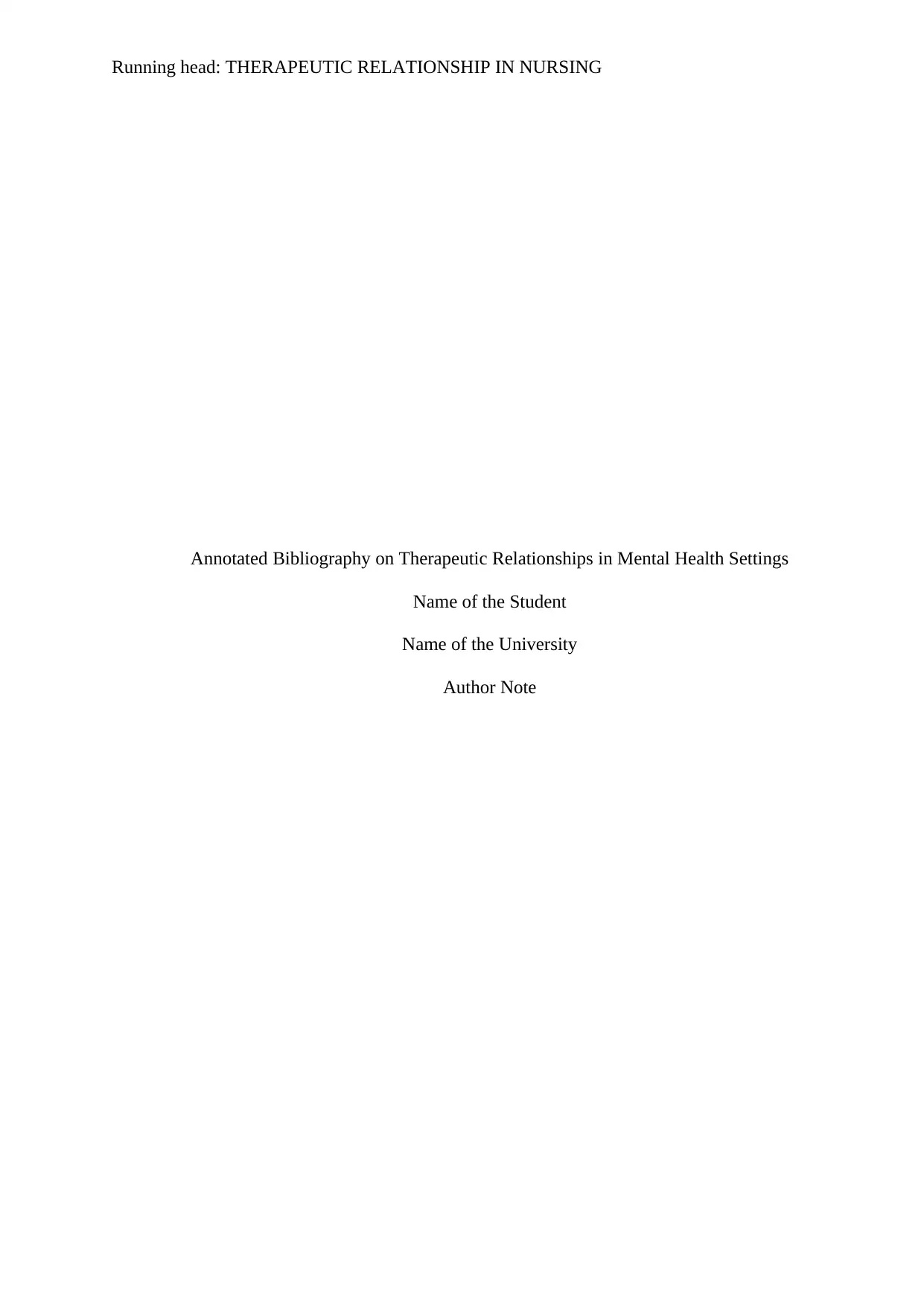
Running head: THERAPEUTIC RELATIONSHIP IN NURSING
Annotated Bibliography on Therapeutic Relationships in Mental Health Settings
Name of the Student
Name of the University
Author Note
Annotated Bibliography on Therapeutic Relationships in Mental Health Settings
Name of the Student
Name of the University
Author Note
Secure Best Marks with AI Grader
Need help grading? Try our AI Grader for instant feedback on your assignments.
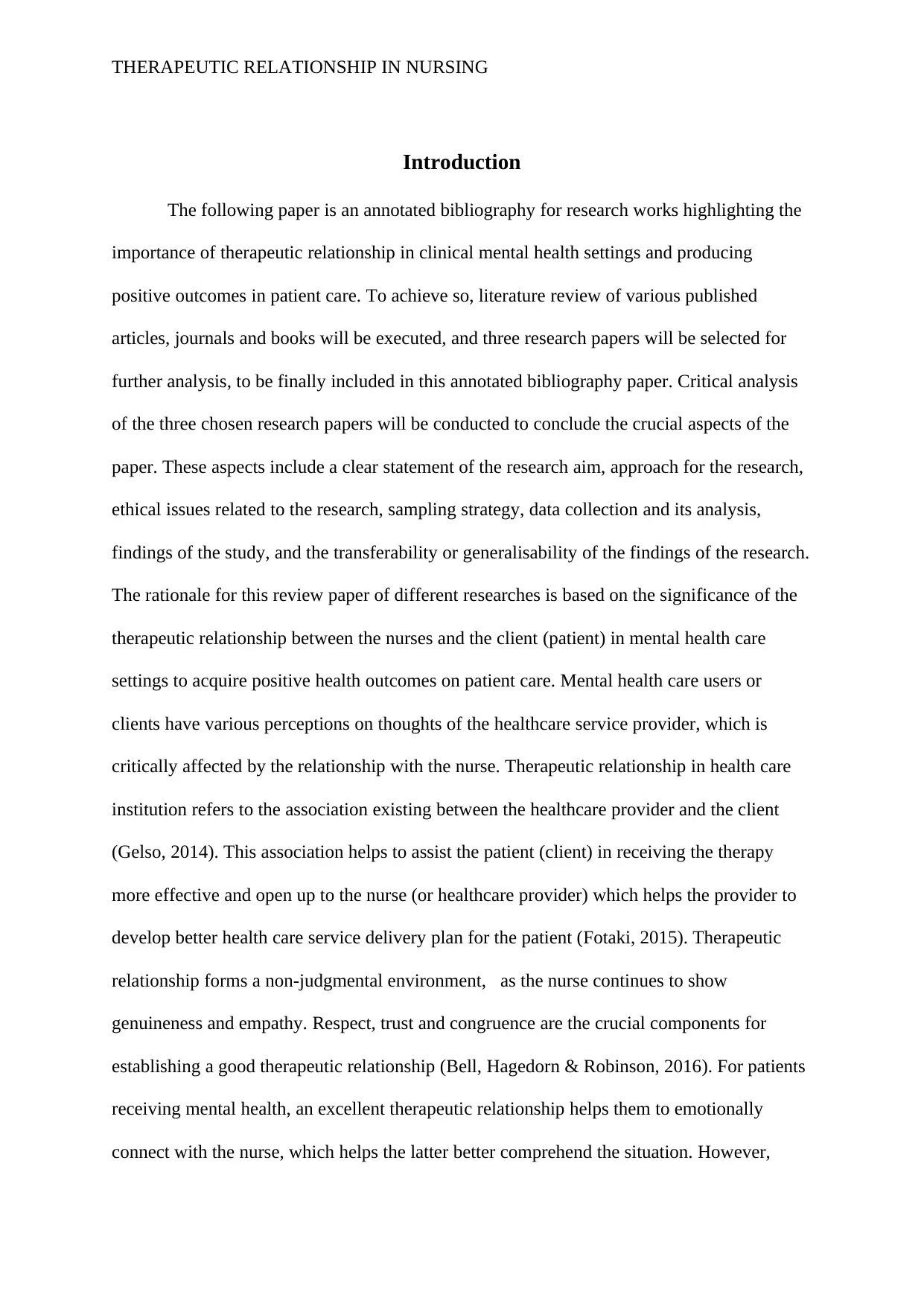
THERAPEUTIC RELATIONSHIP IN NURSING
Introduction
The following paper is an annotated bibliography for research works highlighting the
importance of therapeutic relationship in clinical mental health settings and producing
positive outcomes in patient care. To achieve so, literature review of various published
articles, journals and books will be executed, and three research papers will be selected for
further analysis, to be finally included in this annotated bibliography paper. Critical analysis
of the three chosen research papers will be conducted to conclude the crucial aspects of the
paper. These aspects include a clear statement of the research aim, approach for the research,
ethical issues related to the research, sampling strategy, data collection and its analysis,
findings of the study, and the transferability or generalisability of the findings of the research.
The rationale for this review paper of different researches is based on the significance of the
therapeutic relationship between the nurses and the client (patient) in mental health care
settings to acquire positive health outcomes on patient care. Mental health care users or
clients have various perceptions on thoughts of the healthcare service provider, which is
critically affected by the relationship with the nurse. Therapeutic relationship in health care
institution refers to the association existing between the healthcare provider and the client
(Gelso, 2014). This association helps to assist the patient (client) in receiving the therapy
more effective and open up to the nurse (or healthcare provider) which helps the provider to
develop better health care service delivery plan for the patient (Fotaki, 2015). Therapeutic
relationship forms a non-judgmental environment, as the nurse continues to show
genuineness and empathy. Respect, trust and congruence are the crucial components for
establishing a good therapeutic relationship (Bell, Hagedorn & Robinson, 2016). For patients
receiving mental health, an excellent therapeutic relationship helps them to emotionally
connect with the nurse, which helps the latter better comprehend the situation. However,
Introduction
The following paper is an annotated bibliography for research works highlighting the
importance of therapeutic relationship in clinical mental health settings and producing
positive outcomes in patient care. To achieve so, literature review of various published
articles, journals and books will be executed, and three research papers will be selected for
further analysis, to be finally included in this annotated bibliography paper. Critical analysis
of the three chosen research papers will be conducted to conclude the crucial aspects of the
paper. These aspects include a clear statement of the research aim, approach for the research,
ethical issues related to the research, sampling strategy, data collection and its analysis,
findings of the study, and the transferability or generalisability of the findings of the research.
The rationale for this review paper of different researches is based on the significance of the
therapeutic relationship between the nurses and the client (patient) in mental health care
settings to acquire positive health outcomes on patient care. Mental health care users or
clients have various perceptions on thoughts of the healthcare service provider, which is
critically affected by the relationship with the nurse. Therapeutic relationship in health care
institution refers to the association existing between the healthcare provider and the client
(Gelso, 2014). This association helps to assist the patient (client) in receiving the therapy
more effective and open up to the nurse (or healthcare provider) which helps the provider to
develop better health care service delivery plan for the patient (Fotaki, 2015). Therapeutic
relationship forms a non-judgmental environment, as the nurse continues to show
genuineness and empathy. Respect, trust and congruence are the crucial components for
establishing a good therapeutic relationship (Bell, Hagedorn & Robinson, 2016). For patients
receiving mental health, an excellent therapeutic relationship helps them to emotionally
connect with the nurse, which helps the latter better comprehend the situation. However,
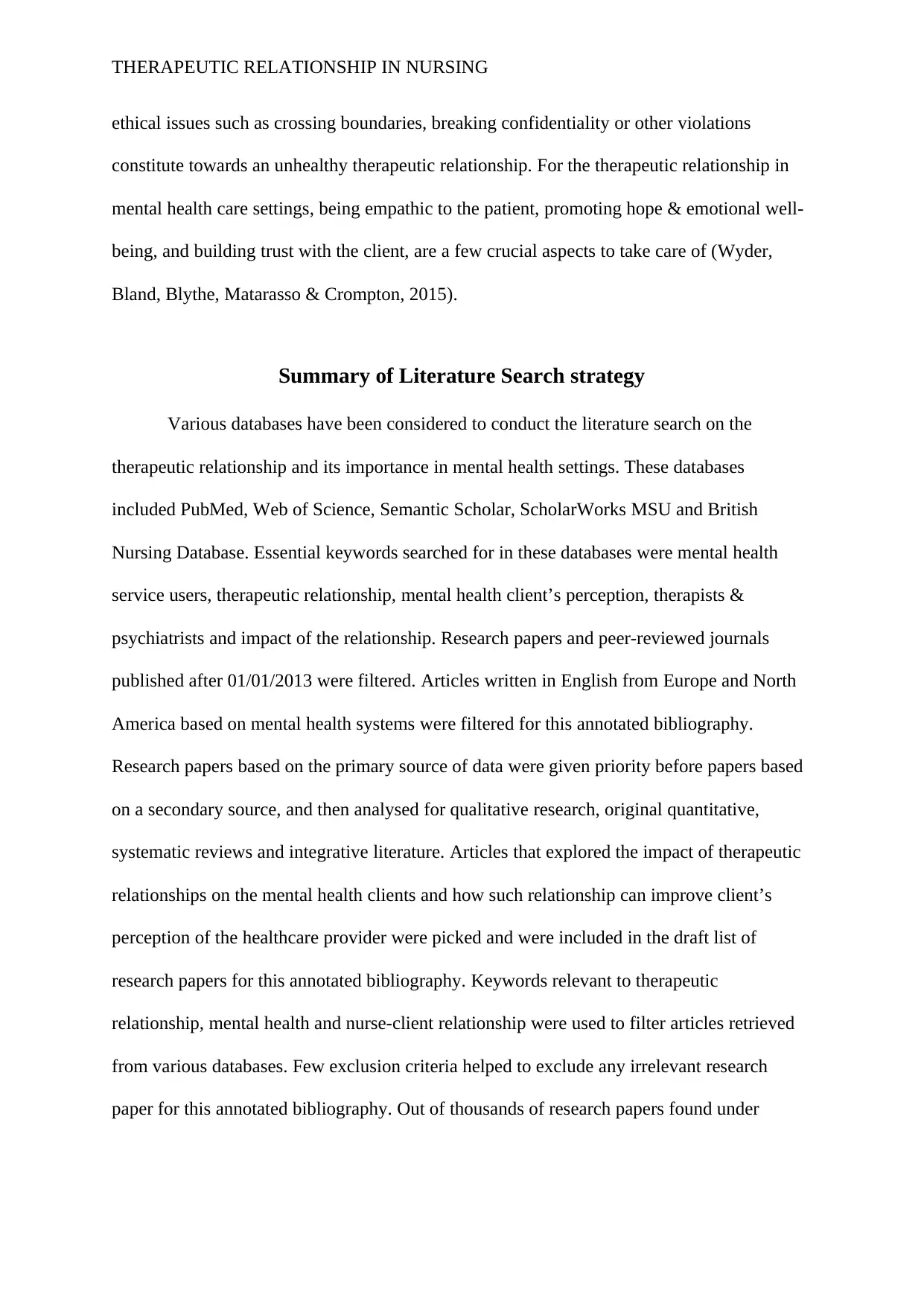
THERAPEUTIC RELATIONSHIP IN NURSING
ethical issues such as crossing boundaries, breaking confidentiality or other violations
constitute towards an unhealthy therapeutic relationship. For the therapeutic relationship in
mental health care settings, being empathic to the patient, promoting hope & emotional well-
being, and building trust with the client, are a few crucial aspects to take care of (Wyder,
Bland, Blythe, Matarasso & Crompton, 2015).
Summary of Literature Search strategy
Various databases have been considered to conduct the literature search on the
therapeutic relationship and its importance in mental health settings. These databases
included PubMed, Web of Science, Semantic Scholar, ScholarWorks MSU and British
Nursing Database. Essential keywords searched for in these databases were mental health
service users, therapeutic relationship, mental health client’s perception, therapists &
psychiatrists and impact of the relationship. Research papers and peer-reviewed journals
published after 01/01/2013 were filtered. Articles written in English from Europe and North
America based on mental health systems were filtered for this annotated bibliography.
Research papers based on the primary source of data were given priority before papers based
on a secondary source, and then analysed for qualitative research, original quantitative,
systematic reviews and integrative literature. Articles that explored the impact of therapeutic
relationships on the mental health clients and how such relationship can improve client’s
perception of the healthcare provider were picked and were included in the draft list of
research papers for this annotated bibliography. Keywords relevant to therapeutic
relationship, mental health and nurse-client relationship were used to filter articles retrieved
from various databases. Few exclusion criteria helped to exclude any irrelevant research
paper for this annotated bibliography. Out of thousands of research papers found under
ethical issues such as crossing boundaries, breaking confidentiality or other violations
constitute towards an unhealthy therapeutic relationship. For the therapeutic relationship in
mental health care settings, being empathic to the patient, promoting hope & emotional well-
being, and building trust with the client, are a few crucial aspects to take care of (Wyder,
Bland, Blythe, Matarasso & Crompton, 2015).
Summary of Literature Search strategy
Various databases have been considered to conduct the literature search on the
therapeutic relationship and its importance in mental health settings. These databases
included PubMed, Web of Science, Semantic Scholar, ScholarWorks MSU and British
Nursing Database. Essential keywords searched for in these databases were mental health
service users, therapeutic relationship, mental health client’s perception, therapists &
psychiatrists and impact of the relationship. Research papers and peer-reviewed journals
published after 01/01/2013 were filtered. Articles written in English from Europe and North
America based on mental health systems were filtered for this annotated bibliography.
Research papers based on the primary source of data were given priority before papers based
on a secondary source, and then analysed for qualitative research, original quantitative,
systematic reviews and integrative literature. Articles that explored the impact of therapeutic
relationships on the mental health clients and how such relationship can improve client’s
perception of the healthcare provider were picked and were included in the draft list of
research papers for this annotated bibliography. Keywords relevant to therapeutic
relationship, mental health and nurse-client relationship were used to filter articles retrieved
from various databases. Few exclusion criteria helped to exclude any irrelevant research
paper for this annotated bibliography. Out of thousands of research papers found under

THERAPEUTIC RELATIONSHIP IN NURSING
various databases, only three were chosen for this annotated bibliography and further
analysis.
various databases, only three were chosen for this annotated bibliography and further
analysis.
Secure Best Marks with AI Grader
Need help grading? Try our AI Grader for instant feedback on your assignments.
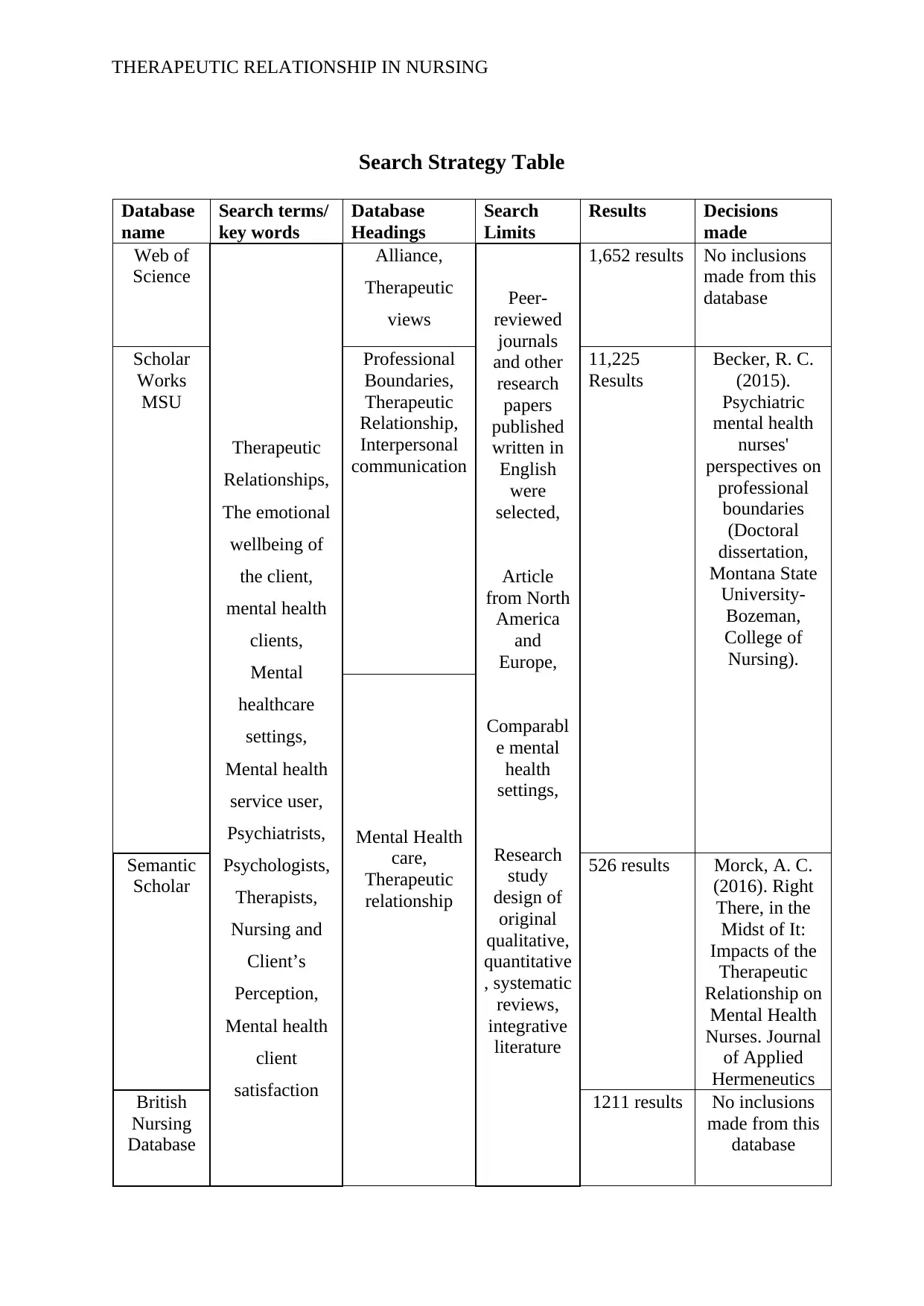
THERAPEUTIC RELATIONSHIP IN NURSING
Search Strategy Table
Database
name
Search terms/
key words
Database
Headings
Search
Limits
Results Decisions
made
Web of
Science
Therapeutic
Relationships,
The emotional
wellbeing of
the client,
mental health
clients,
Mental
healthcare
settings,
Mental health
service user,
Psychiatrists,
Psychologists,
Therapists,
Nursing and
Client’s
Perception,
Mental health
client
satisfaction
Alliance,
Therapeutic
views
Peer-
reviewed
journals
and other
research
papers
published
written in
English
were
selected,
Article
from North
America
and
Europe,
Comparabl
e mental
health
settings,
Research
study
design of
original
qualitative,
quantitative
, systematic
reviews,
integrative
literature
1,652 results No inclusions
made from this
database
Scholar
Works
MSU
Professional
Boundaries,
Therapeutic
Relationship,
Interpersonal
communication
11,225
Results
Becker, R. C.
(2015).
Psychiatric
mental health
nurses'
perspectives on
professional
boundaries
(Doctoral
dissertation,
Montana State
University-
Bozeman,
College of
Nursing).
Mental Health
care,
Therapeutic
relationship
Semantic
Scholar
526 results Morck, A. C.
(2016). Right
There, in the
Midst of It:
Impacts of the
Therapeutic
Relationship on
Mental Health
Nurses. Journal
of Applied
Hermeneutics
British
Nursing
Database
1211 results No inclusions
made from this
database
Search Strategy Table
Database
name
Search terms/
key words
Database
Headings
Search
Limits
Results Decisions
made
Web of
Science
Therapeutic
Relationships,
The emotional
wellbeing of
the client,
mental health
clients,
Mental
healthcare
settings,
Mental health
service user,
Psychiatrists,
Psychologists,
Therapists,
Nursing and
Client’s
Perception,
Mental health
client
satisfaction
Alliance,
Therapeutic
views
Peer-
reviewed
journals
and other
research
papers
published
written in
English
were
selected,
Article
from North
America
and
Europe,
Comparabl
e mental
health
settings,
Research
study
design of
original
qualitative,
quantitative
, systematic
reviews,
integrative
literature
1,652 results No inclusions
made from this
database
Scholar
Works
MSU
Professional
Boundaries,
Therapeutic
Relationship,
Interpersonal
communication
11,225
Results
Becker, R. C.
(2015).
Psychiatric
mental health
nurses'
perspectives on
professional
boundaries
(Doctoral
dissertation,
Montana State
University-
Bozeman,
College of
Nursing).
Mental Health
care,
Therapeutic
relationship
Semantic
Scholar
526 results Morck, A. C.
(2016). Right
There, in the
Midst of It:
Impacts of the
Therapeutic
Relationship on
Mental Health
Nurses. Journal
of Applied
Hermeneutics
British
Nursing
Database
1211 results No inclusions
made from this
database
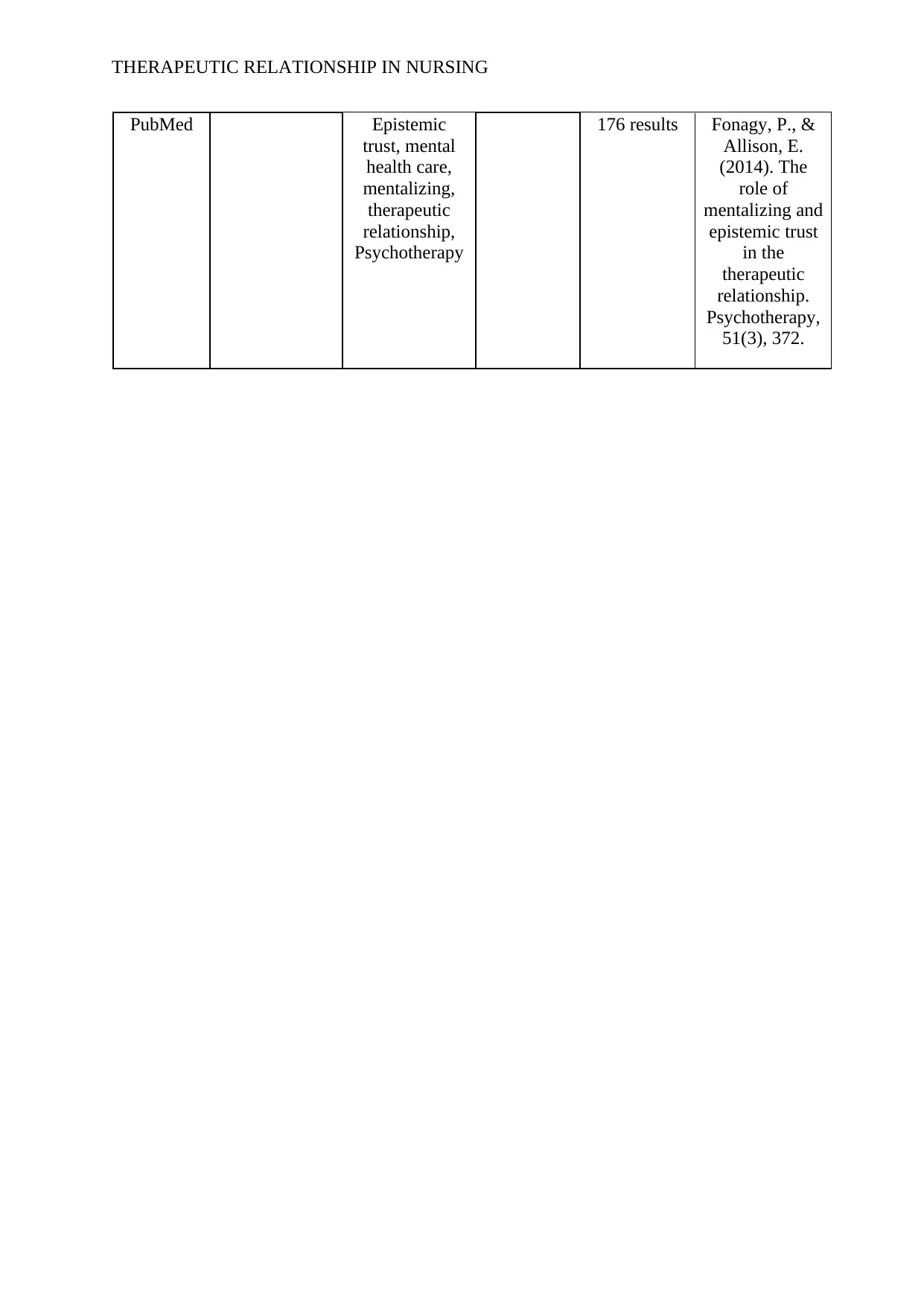
THERAPEUTIC RELATIONSHIP IN NURSING
PubMed Epistemic
trust, mental
health care,
mentalizing,
therapeutic
relationship,
Psychotherapy
176 results Fonagy, P., &
Allison, E.
(2014). The
role of
mentalizing and
epistemic trust
in the
therapeutic
relationship.
Psychotherapy,
51(3), 372.
PubMed Epistemic
trust, mental
health care,
mentalizing,
therapeutic
relationship,
Psychotherapy
176 results Fonagy, P., &
Allison, E.
(2014). The
role of
mentalizing and
epistemic trust
in the
therapeutic
relationship.
Psychotherapy,
51(3), 372.
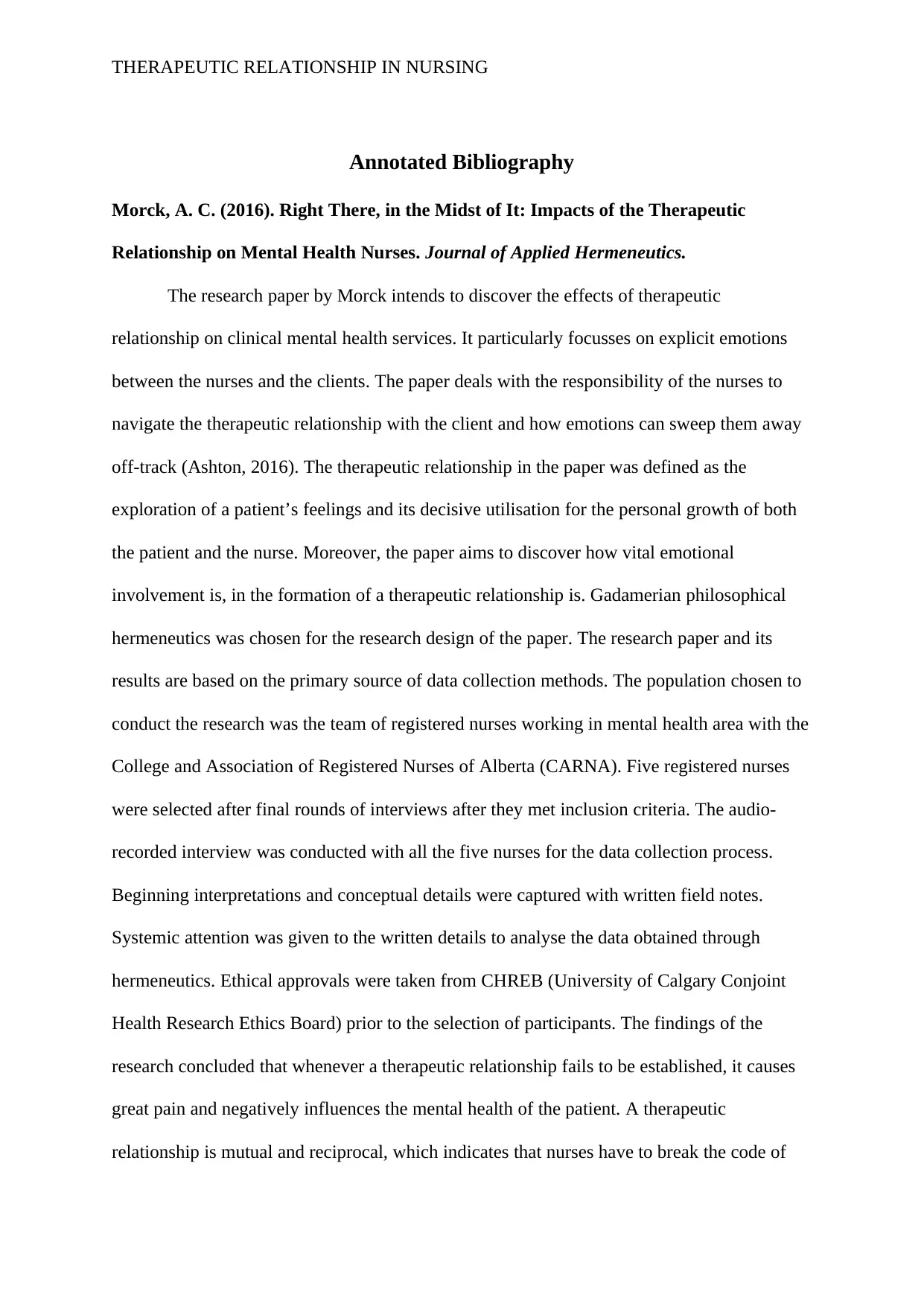
THERAPEUTIC RELATIONSHIP IN NURSING
Annotated Bibliography
Morck, A. C. (2016). Right There, in the Midst of It: Impacts of the Therapeutic
Relationship on Mental Health Nurses. Journal of Applied Hermeneutics.
The research paper by Morck intends to discover the effects of therapeutic
relationship on clinical mental health services. It particularly focusses on explicit emotions
between the nurses and the clients. The paper deals with the responsibility of the nurses to
navigate the therapeutic relationship with the client and how emotions can sweep them away
off-track (Ashton, 2016). The therapeutic relationship in the paper was defined as the
exploration of a patient’s feelings and its decisive utilisation for the personal growth of both
the patient and the nurse. Moreover, the paper aims to discover how vital emotional
involvement is, in the formation of a therapeutic relationship is. Gadamerian philosophical
hermeneutics was chosen for the research design of the paper. The research paper and its
results are based on the primary source of data collection methods. The population chosen to
conduct the research was the team of registered nurses working in mental health area with the
College and Association of Registered Nurses of Alberta (CARNA). Five registered nurses
were selected after final rounds of interviews after they met inclusion criteria. The audio-
recorded interview was conducted with all the five nurses for the data collection process.
Beginning interpretations and conceptual details were captured with written field notes.
Systemic attention was given to the written details to analyse the data obtained through
hermeneutics. Ethical approvals were taken from CHREB (University of Calgary Conjoint
Health Research Ethics Board) prior to the selection of participants. The findings of the
research concluded that whenever a therapeutic relationship fails to be established, it causes
great pain and negatively influences the mental health of the patient. A therapeutic
relationship is mutual and reciprocal, which indicates that nurses have to break the code of
Annotated Bibliography
Morck, A. C. (2016). Right There, in the Midst of It: Impacts of the Therapeutic
Relationship on Mental Health Nurses. Journal of Applied Hermeneutics.
The research paper by Morck intends to discover the effects of therapeutic
relationship on clinical mental health services. It particularly focusses on explicit emotions
between the nurses and the clients. The paper deals with the responsibility of the nurses to
navigate the therapeutic relationship with the client and how emotions can sweep them away
off-track (Ashton, 2016). The therapeutic relationship in the paper was defined as the
exploration of a patient’s feelings and its decisive utilisation for the personal growth of both
the patient and the nurse. Moreover, the paper aims to discover how vital emotional
involvement is, in the formation of a therapeutic relationship is. Gadamerian philosophical
hermeneutics was chosen for the research design of the paper. The research paper and its
results are based on the primary source of data collection methods. The population chosen to
conduct the research was the team of registered nurses working in mental health area with the
College and Association of Registered Nurses of Alberta (CARNA). Five registered nurses
were selected after final rounds of interviews after they met inclusion criteria. The audio-
recorded interview was conducted with all the five nurses for the data collection process.
Beginning interpretations and conceptual details were captured with written field notes.
Systemic attention was given to the written details to analyse the data obtained through
hermeneutics. Ethical approvals were taken from CHREB (University of Calgary Conjoint
Health Research Ethics Board) prior to the selection of participants. The findings of the
research concluded that whenever a therapeutic relationship fails to be established, it causes
great pain and negatively influences the mental health of the patient. A therapeutic
relationship is mutual and reciprocal, which indicates that nurses have to break the code of
Paraphrase This Document
Need a fresh take? Get an instant paraphrase of this document with our AI Paraphraser
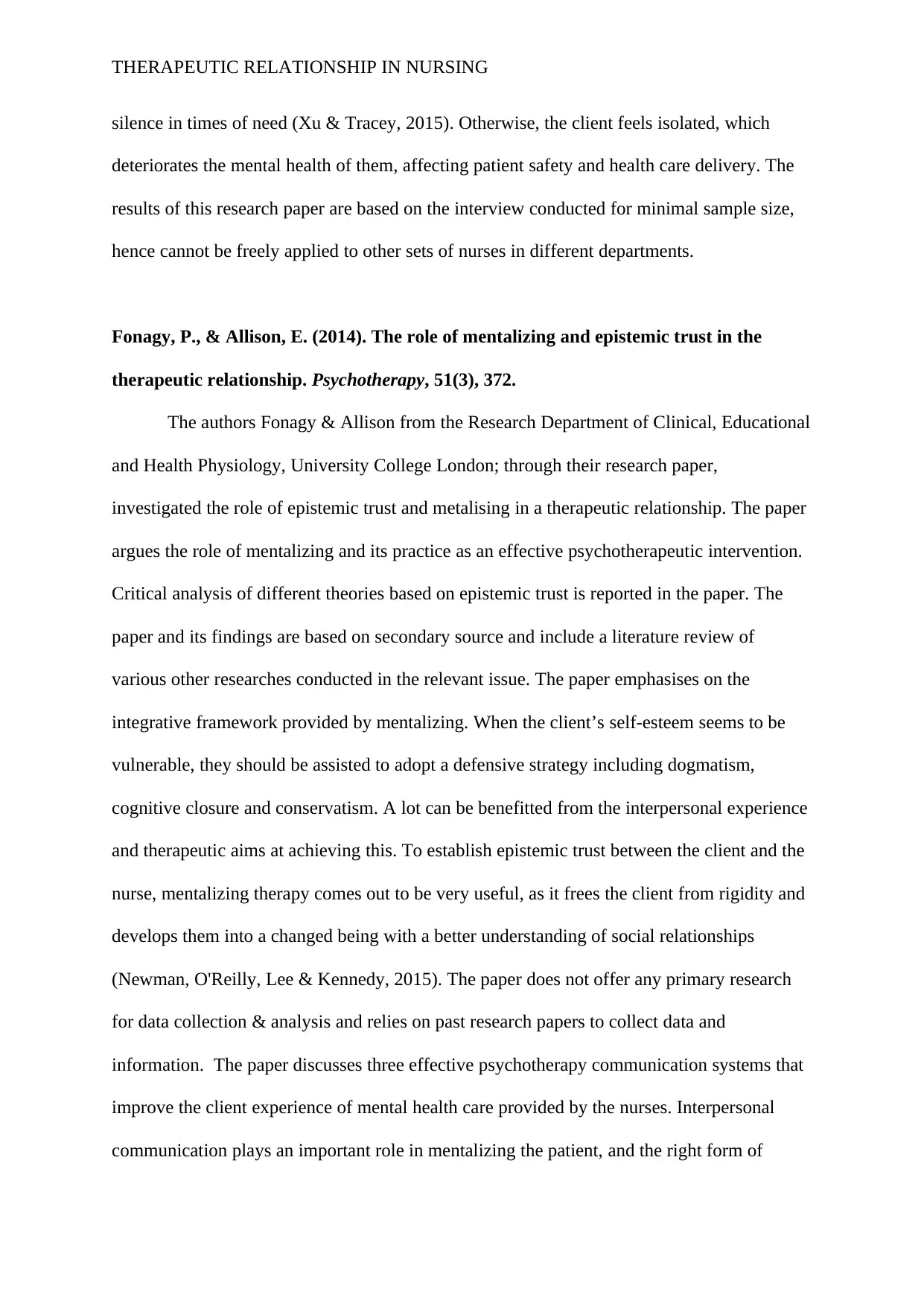
THERAPEUTIC RELATIONSHIP IN NURSING
silence in times of need (Xu & Tracey, 2015). Otherwise, the client feels isolated, which
deteriorates the mental health of them, affecting patient safety and health care delivery. The
results of this research paper are based on the interview conducted for minimal sample size,
hence cannot be freely applied to other sets of nurses in different departments.
Fonagy, P., & Allison, E. (2014). The role of mentalizing and epistemic trust in the
therapeutic relationship. Psychotherapy, 51(3), 372.
The authors Fonagy & Allison from the Research Department of Clinical, Educational
and Health Physiology, University College London; through their research paper,
investigated the role of epistemic trust and metalising in a therapeutic relationship. The paper
argues the role of mentalizing and its practice as an effective psychotherapeutic intervention.
Critical analysis of different theories based on epistemic trust is reported in the paper. The
paper and its findings are based on secondary source and include a literature review of
various other researches conducted in the relevant issue. The paper emphasises on the
integrative framework provided by mentalizing. When the client’s self-esteem seems to be
vulnerable, they should be assisted to adopt a defensive strategy including dogmatism,
cognitive closure and conservatism. A lot can be benefitted from the interpersonal experience
and therapeutic aims at achieving this. To establish epistemic trust between the client and the
nurse, mentalizing therapy comes out to be very useful, as it frees the client from rigidity and
develops them into a changed being with a better understanding of social relationships
(Newman, O'Reilly, Lee & Kennedy, 2015). The paper does not offer any primary research
for data collection & analysis and relies on past research papers to collect data and
information. The paper discusses three effective psychotherapy communication systems that
improve the client experience of mental health care provided by the nurses. Interpersonal
communication plays an important role in mentalizing the patient, and the right form of
silence in times of need (Xu & Tracey, 2015). Otherwise, the client feels isolated, which
deteriorates the mental health of them, affecting patient safety and health care delivery. The
results of this research paper are based on the interview conducted for minimal sample size,
hence cannot be freely applied to other sets of nurses in different departments.
Fonagy, P., & Allison, E. (2014). The role of mentalizing and epistemic trust in the
therapeutic relationship. Psychotherapy, 51(3), 372.
The authors Fonagy & Allison from the Research Department of Clinical, Educational
and Health Physiology, University College London; through their research paper,
investigated the role of epistemic trust and metalising in a therapeutic relationship. The paper
argues the role of mentalizing and its practice as an effective psychotherapeutic intervention.
Critical analysis of different theories based on epistemic trust is reported in the paper. The
paper and its findings are based on secondary source and include a literature review of
various other researches conducted in the relevant issue. The paper emphasises on the
integrative framework provided by mentalizing. When the client’s self-esteem seems to be
vulnerable, they should be assisted to adopt a defensive strategy including dogmatism,
cognitive closure and conservatism. A lot can be benefitted from the interpersonal experience
and therapeutic aims at achieving this. To establish epistemic trust between the client and the
nurse, mentalizing therapy comes out to be very useful, as it frees the client from rigidity and
develops them into a changed being with a better understanding of social relationships
(Newman, O'Reilly, Lee & Kennedy, 2015). The paper does not offer any primary research
for data collection & analysis and relies on past research papers to collect data and
information. The paper discusses three effective psychotherapy communication systems that
improve the client experience of mental health care provided by the nurses. Interpersonal
communication plays an important role in mentalizing the patient, and the right form of
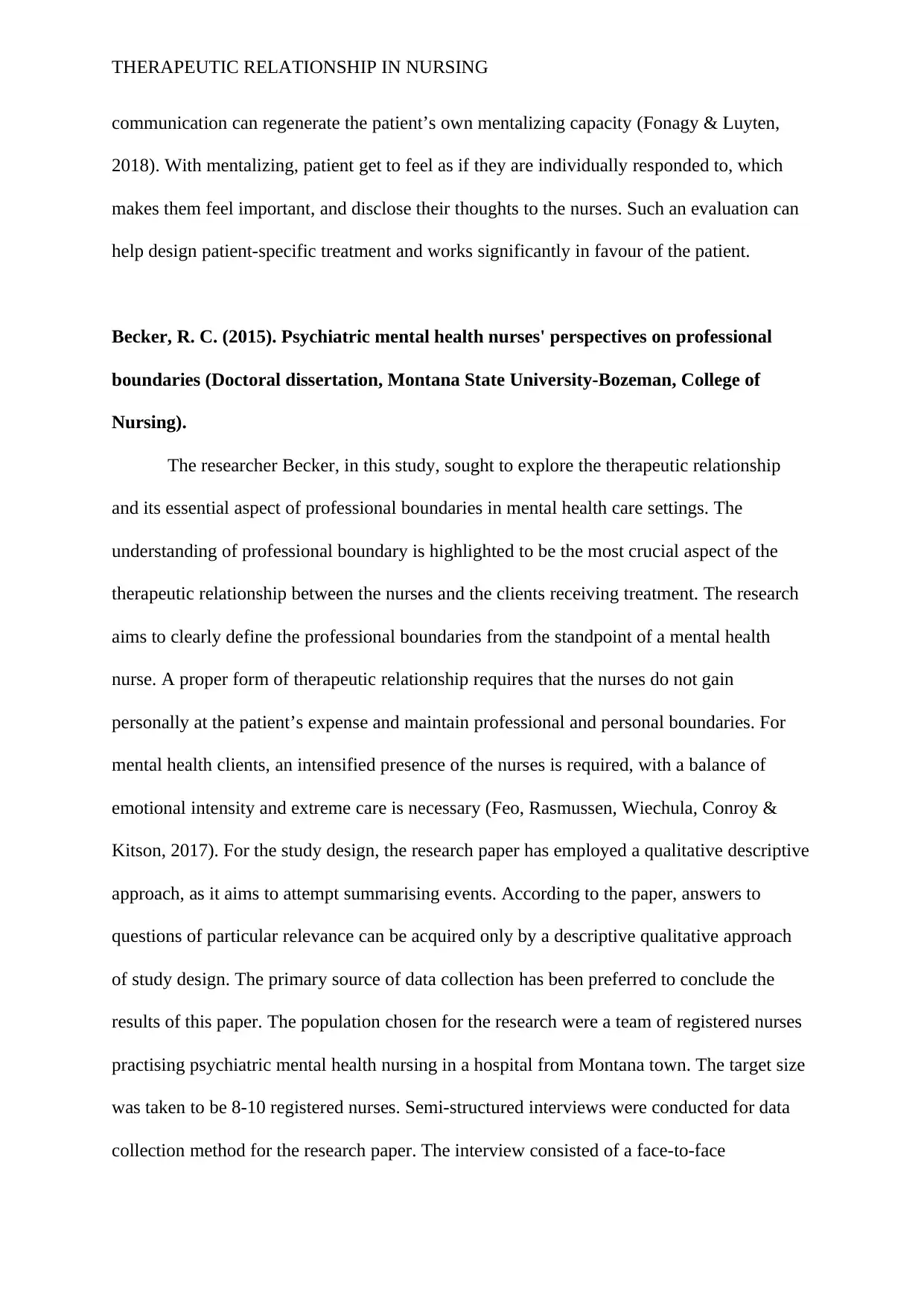
THERAPEUTIC RELATIONSHIP IN NURSING
communication can regenerate the patient’s own mentalizing capacity (Fonagy & Luyten,
2018). With mentalizing, patient get to feel as if they are individually responded to, which
makes them feel important, and disclose their thoughts to the nurses. Such an evaluation can
help design patient-specific treatment and works significantly in favour of the patient.
Becker, R. C. (2015). Psychiatric mental health nurses' perspectives on professional
boundaries (Doctoral dissertation, Montana State University-Bozeman, College of
Nursing).
The researcher Becker, in this study, sought to explore the therapeutic relationship
and its essential aspect of professional boundaries in mental health care settings. The
understanding of professional boundary is highlighted to be the most crucial aspect of the
therapeutic relationship between the nurses and the clients receiving treatment. The research
aims to clearly define the professional boundaries from the standpoint of a mental health
nurse. A proper form of therapeutic relationship requires that the nurses do not gain
personally at the patient’s expense and maintain professional and personal boundaries. For
mental health clients, an intensified presence of the nurses is required, with a balance of
emotional intensity and extreme care is necessary (Feo, Rasmussen, Wiechula, Conroy &
Kitson, 2017). For the study design, the research paper has employed a qualitative descriptive
approach, as it aims to attempt summarising events. According to the paper, answers to
questions of particular relevance can be acquired only by a descriptive qualitative approach
of study design. The primary source of data collection has been preferred to conclude the
results of this paper. The population chosen for the research were a team of registered nurses
practising psychiatric mental health nursing in a hospital from Montana town. The target size
was taken to be 8-10 registered nurses. Semi-structured interviews were conducted for data
collection method for the research paper. The interview consisted of a face-to-face
communication can regenerate the patient’s own mentalizing capacity (Fonagy & Luyten,
2018). With mentalizing, patient get to feel as if they are individually responded to, which
makes them feel important, and disclose their thoughts to the nurses. Such an evaluation can
help design patient-specific treatment and works significantly in favour of the patient.
Becker, R. C. (2015). Psychiatric mental health nurses' perspectives on professional
boundaries (Doctoral dissertation, Montana State University-Bozeman, College of
Nursing).
The researcher Becker, in this study, sought to explore the therapeutic relationship
and its essential aspect of professional boundaries in mental health care settings. The
understanding of professional boundary is highlighted to be the most crucial aspect of the
therapeutic relationship between the nurses and the clients receiving treatment. The research
aims to clearly define the professional boundaries from the standpoint of a mental health
nurse. A proper form of therapeutic relationship requires that the nurses do not gain
personally at the patient’s expense and maintain professional and personal boundaries. For
mental health clients, an intensified presence of the nurses is required, with a balance of
emotional intensity and extreme care is necessary (Feo, Rasmussen, Wiechula, Conroy &
Kitson, 2017). For the study design, the research paper has employed a qualitative descriptive
approach, as it aims to attempt summarising events. According to the paper, answers to
questions of particular relevance can be acquired only by a descriptive qualitative approach
of study design. The primary source of data collection has been preferred to conclude the
results of this paper. The population chosen for the research were a team of registered nurses
practising psychiatric mental health nursing in a hospital from Montana town. The target size
was taken to be 8-10 registered nurses. Semi-structured interviews were conducted for data
collection method for the research paper. The interview consisted of a face-to-face
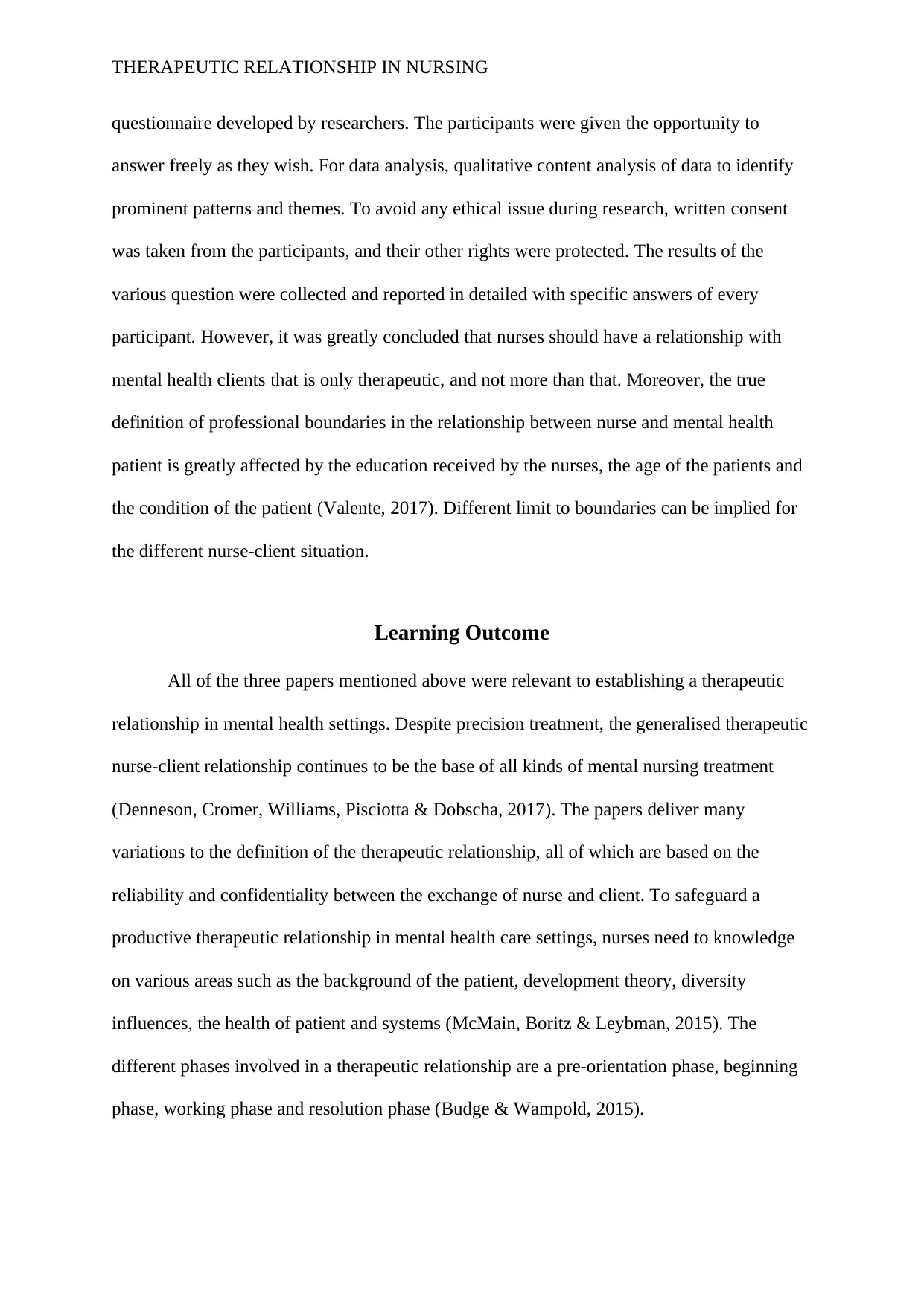
THERAPEUTIC RELATIONSHIP IN NURSING
questionnaire developed by researchers. The participants were given the opportunity to
answer freely as they wish. For data analysis, qualitative content analysis of data to identify
prominent patterns and themes. To avoid any ethical issue during research, written consent
was taken from the participants, and their other rights were protected. The results of the
various question were collected and reported in detailed with specific answers of every
participant. However, it was greatly concluded that nurses should have a relationship with
mental health clients that is only therapeutic, and not more than that. Moreover, the true
definition of professional boundaries in the relationship between nurse and mental health
patient is greatly affected by the education received by the nurses, the age of the patients and
the condition of the patient (Valente, 2017). Different limit to boundaries can be implied for
the different nurse-client situation.
Learning Outcome
All of the three papers mentioned above were relevant to establishing a therapeutic
relationship in mental health settings. Despite precision treatment, the generalised therapeutic
nurse-client relationship continues to be the base of all kinds of mental nursing treatment
(Denneson, Cromer, Williams, Pisciotta & Dobscha, 2017). The papers deliver many
variations to the definition of the therapeutic relationship, all of which are based on the
reliability and confidentiality between the exchange of nurse and client. To safeguard a
productive therapeutic relationship in mental health care settings, nurses need to knowledge
on various areas such as the background of the patient, development theory, diversity
influences, the health of patient and systems (McMain, Boritz & Leybman, 2015). The
different phases involved in a therapeutic relationship are a pre-orientation phase, beginning
phase, working phase and resolution phase (Budge & Wampold, 2015).
questionnaire developed by researchers. The participants were given the opportunity to
answer freely as they wish. For data analysis, qualitative content analysis of data to identify
prominent patterns and themes. To avoid any ethical issue during research, written consent
was taken from the participants, and their other rights were protected. The results of the
various question were collected and reported in detailed with specific answers of every
participant. However, it was greatly concluded that nurses should have a relationship with
mental health clients that is only therapeutic, and not more than that. Moreover, the true
definition of professional boundaries in the relationship between nurse and mental health
patient is greatly affected by the education received by the nurses, the age of the patients and
the condition of the patient (Valente, 2017). Different limit to boundaries can be implied for
the different nurse-client situation.
Learning Outcome
All of the three papers mentioned above were relevant to establishing a therapeutic
relationship in mental health settings. Despite precision treatment, the generalised therapeutic
nurse-client relationship continues to be the base of all kinds of mental nursing treatment
(Denneson, Cromer, Williams, Pisciotta & Dobscha, 2017). The papers deliver many
variations to the definition of the therapeutic relationship, all of which are based on the
reliability and confidentiality between the exchange of nurse and client. To safeguard a
productive therapeutic relationship in mental health care settings, nurses need to knowledge
on various areas such as the background of the patient, development theory, diversity
influences, the health of patient and systems (McMain, Boritz & Leybman, 2015). The
different phases involved in a therapeutic relationship are a pre-orientation phase, beginning
phase, working phase and resolution phase (Budge & Wampold, 2015).
Secure Best Marks with AI Grader
Need help grading? Try our AI Grader for instant feedback on your assignments.
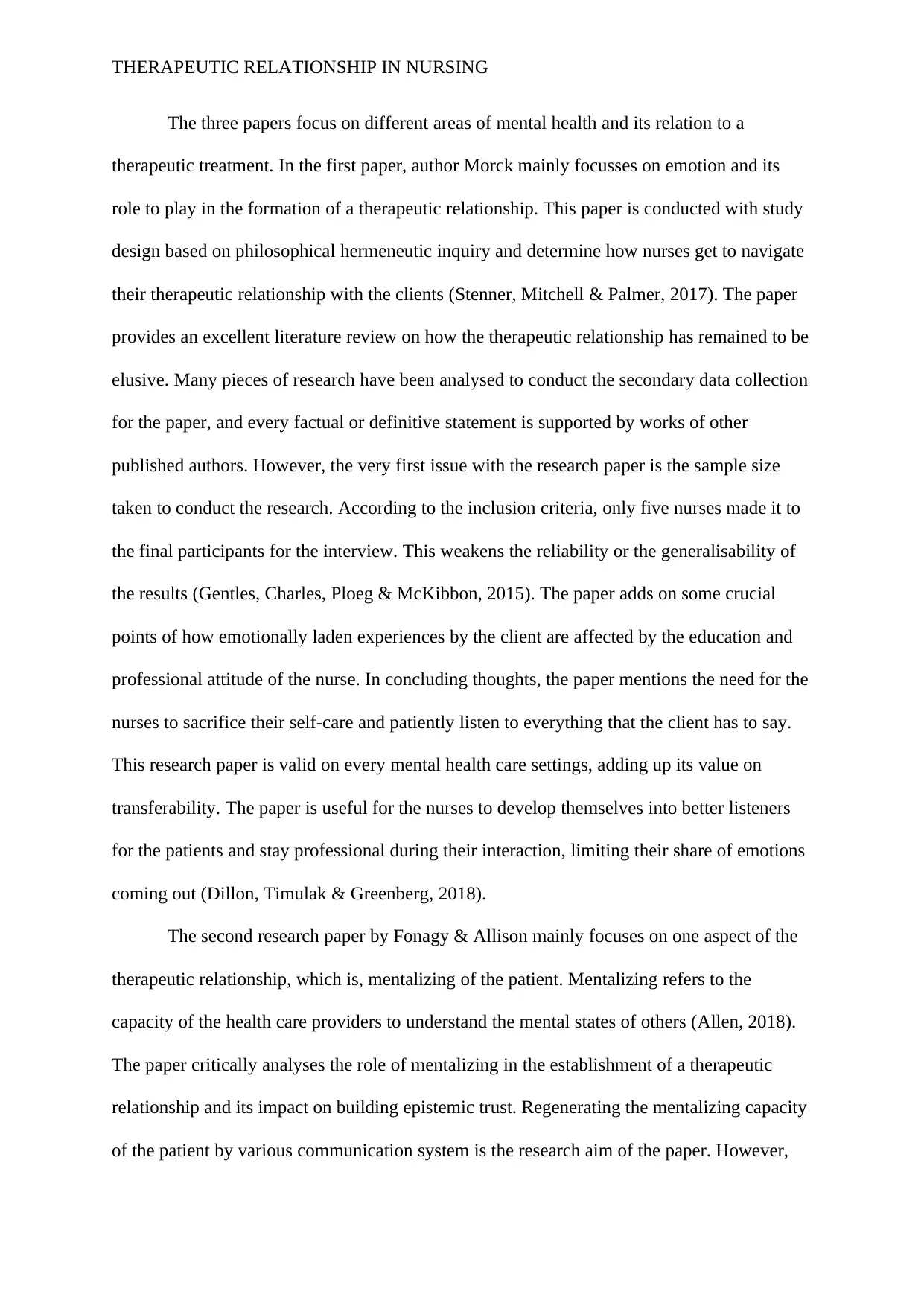
THERAPEUTIC RELATIONSHIP IN NURSING
The three papers focus on different areas of mental health and its relation to a
therapeutic treatment. In the first paper, author Morck mainly focusses on emotion and its
role to play in the formation of a therapeutic relationship. This paper is conducted with study
design based on philosophical hermeneutic inquiry and determine how nurses get to navigate
their therapeutic relationship with the clients (Stenner, Mitchell & Palmer, 2017). The paper
provides an excellent literature review on how the therapeutic relationship has remained to be
elusive. Many pieces of research have been analysed to conduct the secondary data collection
for the paper, and every factual or definitive statement is supported by works of other
published authors. However, the very first issue with the research paper is the sample size
taken to conduct the research. According to the inclusion criteria, only five nurses made it to
the final participants for the interview. This weakens the reliability or the generalisability of
the results (Gentles, Charles, Ploeg & McKibbon, 2015). The paper adds on some crucial
points of how emotionally laden experiences by the client are affected by the education and
professional attitude of the nurse. In concluding thoughts, the paper mentions the need for the
nurses to sacrifice their self-care and patiently listen to everything that the client has to say.
This research paper is valid on every mental health care settings, adding up its value on
transferability. The paper is useful for the nurses to develop themselves into better listeners
for the patients and stay professional during their interaction, limiting their share of emotions
coming out (Dillon, Timulak & Greenberg, 2018).
The second research paper by Fonagy & Allison mainly focuses on one aspect of the
therapeutic relationship, which is, mentalizing of the patient. Mentalizing refers to the
capacity of the health care providers to understand the mental states of others (Allen, 2018).
The paper critically analyses the role of mentalizing in the establishment of a therapeutic
relationship and its impact on building epistemic trust. Regenerating the mentalizing capacity
of the patient by various communication system is the research aim of the paper. However,
The three papers focus on different areas of mental health and its relation to a
therapeutic treatment. In the first paper, author Morck mainly focusses on emotion and its
role to play in the formation of a therapeutic relationship. This paper is conducted with study
design based on philosophical hermeneutic inquiry and determine how nurses get to navigate
their therapeutic relationship with the clients (Stenner, Mitchell & Palmer, 2017). The paper
provides an excellent literature review on how the therapeutic relationship has remained to be
elusive. Many pieces of research have been analysed to conduct the secondary data collection
for the paper, and every factual or definitive statement is supported by works of other
published authors. However, the very first issue with the research paper is the sample size
taken to conduct the research. According to the inclusion criteria, only five nurses made it to
the final participants for the interview. This weakens the reliability or the generalisability of
the results (Gentles, Charles, Ploeg & McKibbon, 2015). The paper adds on some crucial
points of how emotionally laden experiences by the client are affected by the education and
professional attitude of the nurse. In concluding thoughts, the paper mentions the need for the
nurses to sacrifice their self-care and patiently listen to everything that the client has to say.
This research paper is valid on every mental health care settings, adding up its value on
transferability. The paper is useful for the nurses to develop themselves into better listeners
for the patients and stay professional during their interaction, limiting their share of emotions
coming out (Dillon, Timulak & Greenberg, 2018).
The second research paper by Fonagy & Allison mainly focuses on one aspect of the
therapeutic relationship, which is, mentalizing of the patient. Mentalizing refers to the
capacity of the health care providers to understand the mental states of others (Allen, 2018).
The paper critically analyses the role of mentalizing in the establishment of a therapeutic
relationship and its impact on building epistemic trust. Regenerating the mentalizing capacity
of the patient by various communication system is the research aim of the paper. However,
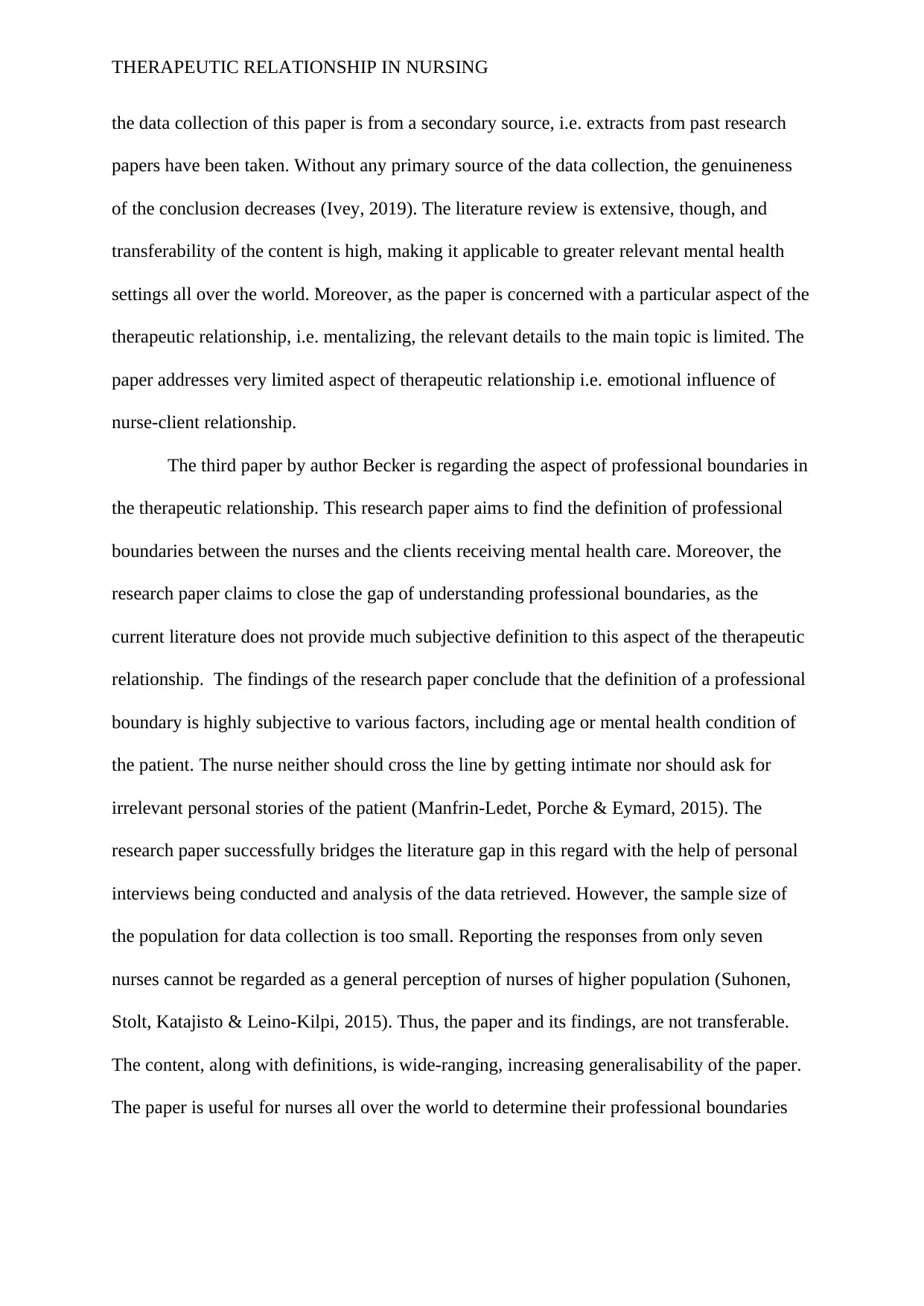
THERAPEUTIC RELATIONSHIP IN NURSING
the data collection of this paper is from a secondary source, i.e. extracts from past research
papers have been taken. Without any primary source of the data collection, the genuineness
of the conclusion decreases (Ivey, 2019). The literature review is extensive, though, and
transferability of the content is high, making it applicable to greater relevant mental health
settings all over the world. Moreover, as the paper is concerned with a particular aspect of the
therapeutic relationship, i.e. mentalizing, the relevant details to the main topic is limited. The
paper addresses very limited aspect of therapeutic relationship i.e. emotional influence of
nurse-client relationship.
The third paper by author Becker is regarding the aspect of professional boundaries in
the therapeutic relationship. This research paper aims to find the definition of professional
boundaries between the nurses and the clients receiving mental health care. Moreover, the
research paper claims to close the gap of understanding professional boundaries, as the
current literature does not provide much subjective definition to this aspect of the therapeutic
relationship. The findings of the research paper conclude that the definition of a professional
boundary is highly subjective to various factors, including age or mental health condition of
the patient. The nurse neither should cross the line by getting intimate nor should ask for
irrelevant personal stories of the patient (Manfrin-Ledet, Porche & Eymard, 2015). The
research paper successfully bridges the literature gap in this regard with the help of personal
interviews being conducted and analysis of the data retrieved. However, the sample size of
the population for data collection is too small. Reporting the responses from only seven
nurses cannot be regarded as a general perception of nurses of higher population (Suhonen,
Stolt, Katajisto & Leino‐Kilpi, 2015). Thus, the paper and its findings, are not transferable.
The content, along with definitions, is wide-ranging, increasing generalisability of the paper.
The paper is useful for nurses all over the world to determine their professional boundaries
the data collection of this paper is from a secondary source, i.e. extracts from past research
papers have been taken. Without any primary source of the data collection, the genuineness
of the conclusion decreases (Ivey, 2019). The literature review is extensive, though, and
transferability of the content is high, making it applicable to greater relevant mental health
settings all over the world. Moreover, as the paper is concerned with a particular aspect of the
therapeutic relationship, i.e. mentalizing, the relevant details to the main topic is limited. The
paper addresses very limited aspect of therapeutic relationship i.e. emotional influence of
nurse-client relationship.
The third paper by author Becker is regarding the aspect of professional boundaries in
the therapeutic relationship. This research paper aims to find the definition of professional
boundaries between the nurses and the clients receiving mental health care. Moreover, the
research paper claims to close the gap of understanding professional boundaries, as the
current literature does not provide much subjective definition to this aspect of the therapeutic
relationship. The findings of the research paper conclude that the definition of a professional
boundary is highly subjective to various factors, including age or mental health condition of
the patient. The nurse neither should cross the line by getting intimate nor should ask for
irrelevant personal stories of the patient (Manfrin-Ledet, Porche & Eymard, 2015). The
research paper successfully bridges the literature gap in this regard with the help of personal
interviews being conducted and analysis of the data retrieved. However, the sample size of
the population for data collection is too small. Reporting the responses from only seven
nurses cannot be regarded as a general perception of nurses of higher population (Suhonen,
Stolt, Katajisto & Leino‐Kilpi, 2015). Thus, the paper and its findings, are not transferable.
The content, along with definitions, is wide-ranging, increasing generalisability of the paper.
The paper is useful for nurses all over the world to determine their professional boundaries
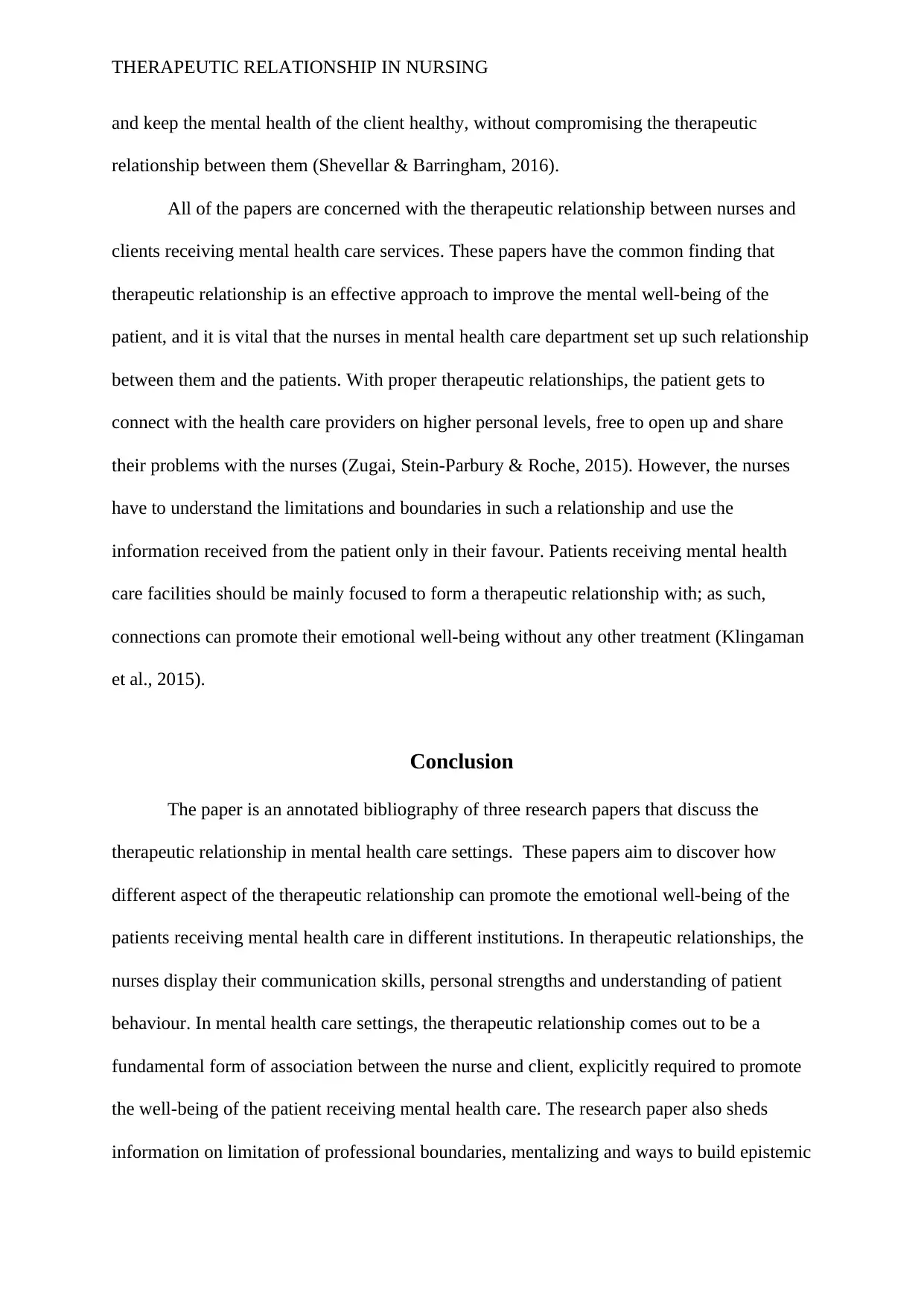
THERAPEUTIC RELATIONSHIP IN NURSING
and keep the mental health of the client healthy, without compromising the therapeutic
relationship between them (Shevellar & Barringham, 2016).
All of the papers are concerned with the therapeutic relationship between nurses and
clients receiving mental health care services. These papers have the common finding that
therapeutic relationship is an effective approach to improve the mental well-being of the
patient, and it is vital that the nurses in mental health care department set up such relationship
between them and the patients. With proper therapeutic relationships, the patient gets to
connect with the health care providers on higher personal levels, free to open up and share
their problems with the nurses (Zugai, Stein-Parbury & Roche, 2015). However, the nurses
have to understand the limitations and boundaries in such a relationship and use the
information received from the patient only in their favour. Patients receiving mental health
care facilities should be mainly focused to form a therapeutic relationship with; as such,
connections can promote their emotional well-being without any other treatment (Klingaman
et al., 2015).
Conclusion
The paper is an annotated bibliography of three research papers that discuss the
therapeutic relationship in mental health care settings. These papers aim to discover how
different aspect of the therapeutic relationship can promote the emotional well-being of the
patients receiving mental health care in different institutions. In therapeutic relationships, the
nurses display their communication skills, personal strengths and understanding of patient
behaviour. In mental health care settings, the therapeutic relationship comes out to be a
fundamental form of association between the nurse and client, explicitly required to promote
the well-being of the patient receiving mental health care. The research paper also sheds
information on limitation of professional boundaries, mentalizing and ways to build epistemic
and keep the mental health of the client healthy, without compromising the therapeutic
relationship between them (Shevellar & Barringham, 2016).
All of the papers are concerned with the therapeutic relationship between nurses and
clients receiving mental health care services. These papers have the common finding that
therapeutic relationship is an effective approach to improve the mental well-being of the
patient, and it is vital that the nurses in mental health care department set up such relationship
between them and the patients. With proper therapeutic relationships, the patient gets to
connect with the health care providers on higher personal levels, free to open up and share
their problems with the nurses (Zugai, Stein-Parbury & Roche, 2015). However, the nurses
have to understand the limitations and boundaries in such a relationship and use the
information received from the patient only in their favour. Patients receiving mental health
care facilities should be mainly focused to form a therapeutic relationship with; as such,
connections can promote their emotional well-being without any other treatment (Klingaman
et al., 2015).
Conclusion
The paper is an annotated bibliography of three research papers that discuss the
therapeutic relationship in mental health care settings. These papers aim to discover how
different aspect of the therapeutic relationship can promote the emotional well-being of the
patients receiving mental health care in different institutions. In therapeutic relationships, the
nurses display their communication skills, personal strengths and understanding of patient
behaviour. In mental health care settings, the therapeutic relationship comes out to be a
fundamental form of association between the nurse and client, explicitly required to promote
the well-being of the patient receiving mental health care. The research paper also sheds
information on limitation of professional boundaries, mentalizing and ways to build epistemic
Paraphrase This Document
Need a fresh take? Get an instant paraphrase of this document with our AI Paraphraser
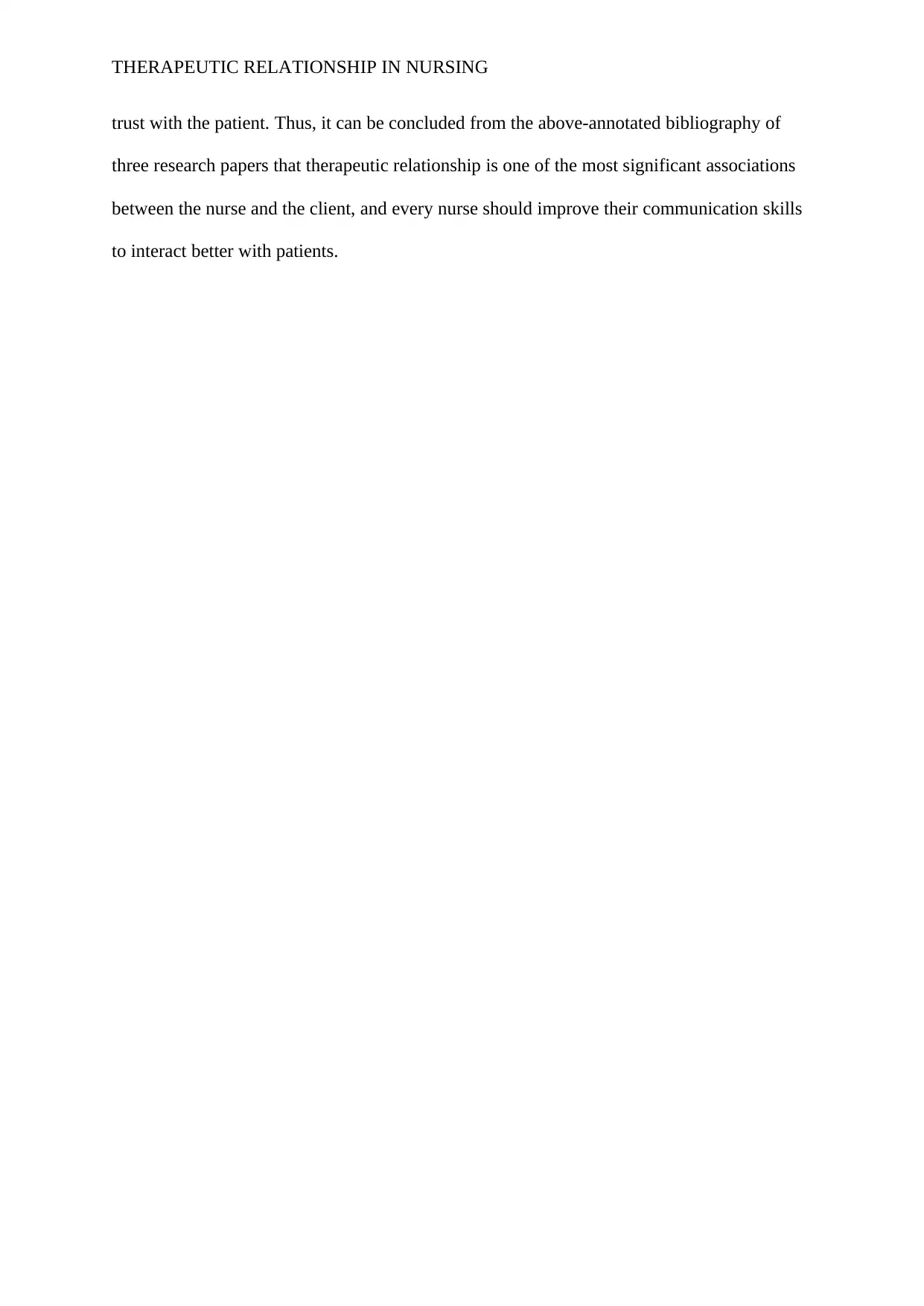
THERAPEUTIC RELATIONSHIP IN NURSING
trust with the patient. Thus, it can be concluded from the above-annotated bibliography of
three research papers that therapeutic relationship is one of the most significant associations
between the nurse and the client, and every nurse should improve their communication skills
to interact better with patients.
trust with the patient. Thus, it can be concluded from the above-annotated bibliography of
three research papers that therapeutic relationship is one of the most significant associations
between the nurse and the client, and every nurse should improve their communication skills
to interact better with patients.
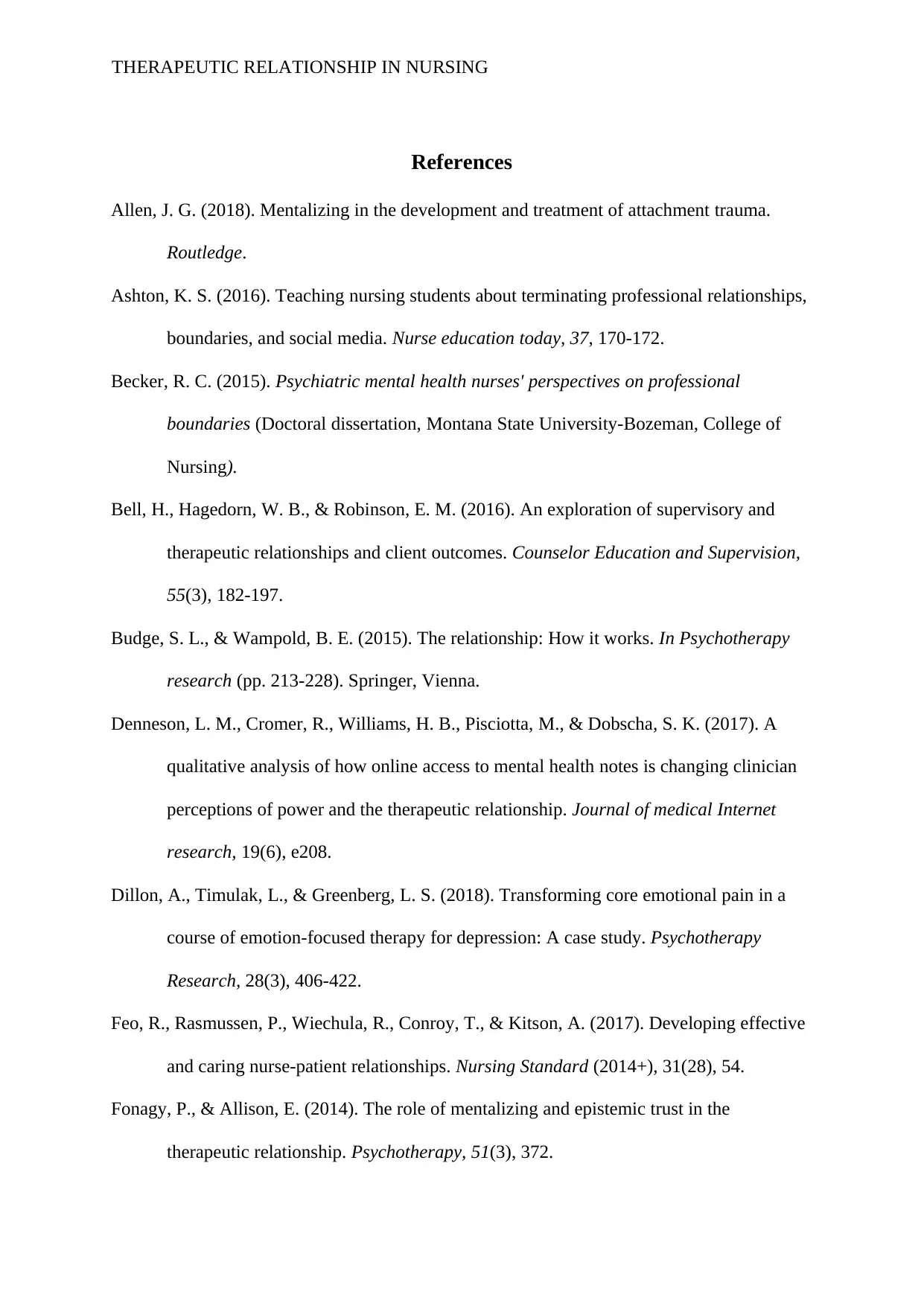
THERAPEUTIC RELATIONSHIP IN NURSING
References
Allen, J. G. (2018). Mentalizing in the development and treatment of attachment trauma.
Routledge.
Ashton, K. S. (2016). Teaching nursing students about terminating professional relationships,
boundaries, and social media. Nurse education today, 37, 170-172.
Becker, R. C. (2015). Psychiatric mental health nurses' perspectives on professional
boundaries (Doctoral dissertation, Montana State University-Bozeman, College of
Nursing).
Bell, H., Hagedorn, W. B., & Robinson, E. M. (2016). An exploration of supervisory and
therapeutic relationships and client outcomes. Counselor Education and Supervision,
55(3), 182-197.
Budge, S. L., & Wampold, B. E. (2015). The relationship: How it works. In Psychotherapy
research (pp. 213-228). Springer, Vienna.
Denneson, L. M., Cromer, R., Williams, H. B., Pisciotta, M., & Dobscha, S. K. (2017). A
qualitative analysis of how online access to mental health notes is changing clinician
perceptions of power and the therapeutic relationship. Journal of medical Internet
research, 19(6), e208.
Dillon, A., Timulak, L., & Greenberg, L. S. (2018). Transforming core emotional pain in a
course of emotion-focused therapy for depression: A case study. Psychotherapy
Research, 28(3), 406-422.
Feo, R., Rasmussen, P., Wiechula, R., Conroy, T., & Kitson, A. (2017). Developing effective
and caring nurse-patient relationships. Nursing Standard (2014+), 31(28), 54.
Fonagy, P., & Allison, E. (2014). The role of mentalizing and epistemic trust in the
therapeutic relationship. Psychotherapy, 51(3), 372.
References
Allen, J. G. (2018). Mentalizing in the development and treatment of attachment trauma.
Routledge.
Ashton, K. S. (2016). Teaching nursing students about terminating professional relationships,
boundaries, and social media. Nurse education today, 37, 170-172.
Becker, R. C. (2015). Psychiatric mental health nurses' perspectives on professional
boundaries (Doctoral dissertation, Montana State University-Bozeman, College of
Nursing).
Bell, H., Hagedorn, W. B., & Robinson, E. M. (2016). An exploration of supervisory and
therapeutic relationships and client outcomes. Counselor Education and Supervision,
55(3), 182-197.
Budge, S. L., & Wampold, B. E. (2015). The relationship: How it works. In Psychotherapy
research (pp. 213-228). Springer, Vienna.
Denneson, L. M., Cromer, R., Williams, H. B., Pisciotta, M., & Dobscha, S. K. (2017). A
qualitative analysis of how online access to mental health notes is changing clinician
perceptions of power and the therapeutic relationship. Journal of medical Internet
research, 19(6), e208.
Dillon, A., Timulak, L., & Greenberg, L. S. (2018). Transforming core emotional pain in a
course of emotion-focused therapy for depression: A case study. Psychotherapy
Research, 28(3), 406-422.
Feo, R., Rasmussen, P., Wiechula, R., Conroy, T., & Kitson, A. (2017). Developing effective
and caring nurse-patient relationships. Nursing Standard (2014+), 31(28), 54.
Fonagy, P., & Allison, E. (2014). The role of mentalizing and epistemic trust in the
therapeutic relationship. Psychotherapy, 51(3), 372.
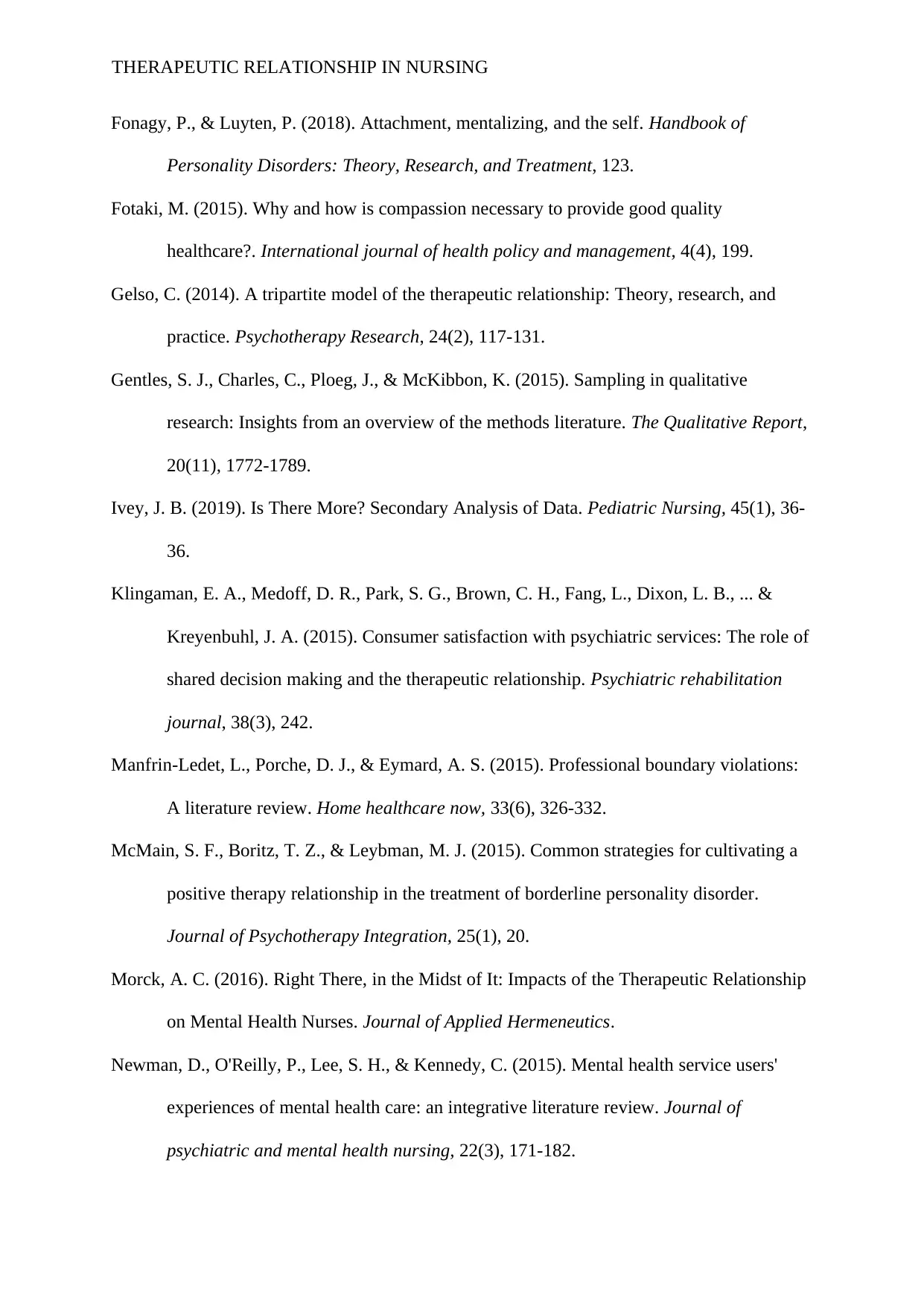
THERAPEUTIC RELATIONSHIP IN NURSING
Fonagy, P., & Luyten, P. (2018). Attachment, mentalizing, and the self. Handbook of
Personality Disorders: Theory, Research, and Treatment, 123.
Fotaki, M. (2015). Why and how is compassion necessary to provide good quality
healthcare?. International journal of health policy and management, 4(4), 199.
Gelso, C. (2014). A tripartite model of the therapeutic relationship: Theory, research, and
practice. Psychotherapy Research, 24(2), 117-131.
Gentles, S. J., Charles, C., Ploeg, J., & McKibbon, K. (2015). Sampling in qualitative
research: Insights from an overview of the methods literature. The Qualitative Report,
20(11), 1772-1789.
Ivey, J. B. (2019). Is There More? Secondary Analysis of Data. Pediatric Nursing, 45(1), 36-
36.
Klingaman, E. A., Medoff, D. R., Park, S. G., Brown, C. H., Fang, L., Dixon, L. B., ... &
Kreyenbuhl, J. A. (2015). Consumer satisfaction with psychiatric services: The role of
shared decision making and the therapeutic relationship. Psychiatric rehabilitation
journal, 38(3), 242.
Manfrin-Ledet, L., Porche, D. J., & Eymard, A. S. (2015). Professional boundary violations:
A literature review. Home healthcare now, 33(6), 326-332.
McMain, S. F., Boritz, T. Z., & Leybman, M. J. (2015). Common strategies for cultivating a
positive therapy relationship in the treatment of borderline personality disorder.
Journal of Psychotherapy Integration, 25(1), 20.
Morck, A. C. (2016). Right There, in the Midst of It: Impacts of the Therapeutic Relationship
on Mental Health Nurses. Journal of Applied Hermeneutics.
Newman, D., O'Reilly, P., Lee, S. H., & Kennedy, C. (2015). Mental health service users'
experiences of mental health care: an integrative literature review. Journal of
psychiatric and mental health nursing, 22(3), 171-182.
Fonagy, P., & Luyten, P. (2018). Attachment, mentalizing, and the self. Handbook of
Personality Disorders: Theory, Research, and Treatment, 123.
Fotaki, M. (2015). Why and how is compassion necessary to provide good quality
healthcare?. International journal of health policy and management, 4(4), 199.
Gelso, C. (2014). A tripartite model of the therapeutic relationship: Theory, research, and
practice. Psychotherapy Research, 24(2), 117-131.
Gentles, S. J., Charles, C., Ploeg, J., & McKibbon, K. (2015). Sampling in qualitative
research: Insights from an overview of the methods literature. The Qualitative Report,
20(11), 1772-1789.
Ivey, J. B. (2019). Is There More? Secondary Analysis of Data. Pediatric Nursing, 45(1), 36-
36.
Klingaman, E. A., Medoff, D. R., Park, S. G., Brown, C. H., Fang, L., Dixon, L. B., ... &
Kreyenbuhl, J. A. (2015). Consumer satisfaction with psychiatric services: The role of
shared decision making and the therapeutic relationship. Psychiatric rehabilitation
journal, 38(3), 242.
Manfrin-Ledet, L., Porche, D. J., & Eymard, A. S. (2015). Professional boundary violations:
A literature review. Home healthcare now, 33(6), 326-332.
McMain, S. F., Boritz, T. Z., & Leybman, M. J. (2015). Common strategies for cultivating a
positive therapy relationship in the treatment of borderline personality disorder.
Journal of Psychotherapy Integration, 25(1), 20.
Morck, A. C. (2016). Right There, in the Midst of It: Impacts of the Therapeutic Relationship
on Mental Health Nurses. Journal of Applied Hermeneutics.
Newman, D., O'Reilly, P., Lee, S. H., & Kennedy, C. (2015). Mental health service users'
experiences of mental health care: an integrative literature review. Journal of
psychiatric and mental health nursing, 22(3), 171-182.
Secure Best Marks with AI Grader
Need help grading? Try our AI Grader for instant feedback on your assignments.
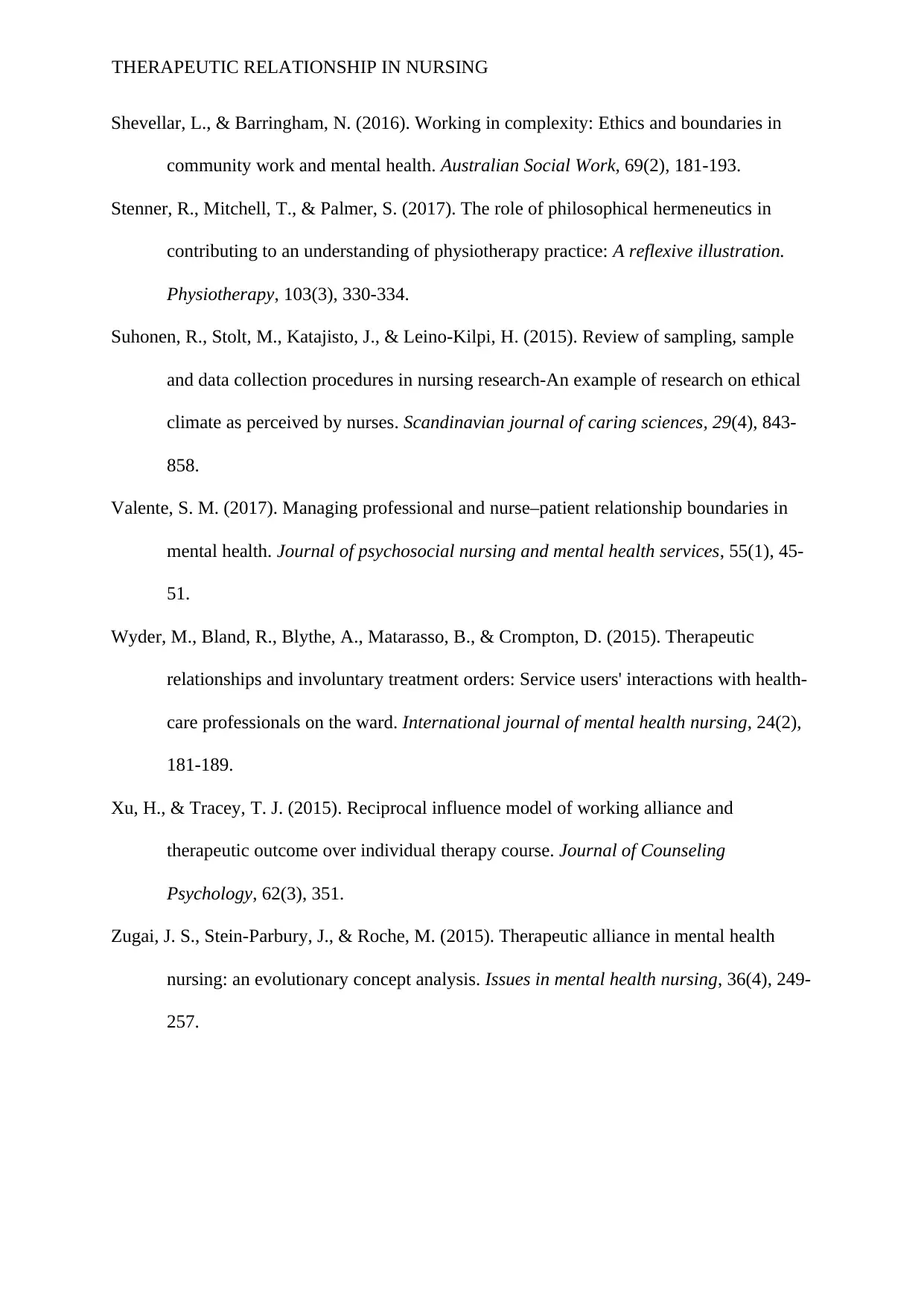
THERAPEUTIC RELATIONSHIP IN NURSING
Shevellar, L., & Barringham, N. (2016). Working in complexity: Ethics and boundaries in
community work and mental health. Australian Social Work, 69(2), 181-193.
Stenner, R., Mitchell, T., & Palmer, S. (2017). The role of philosophical hermeneutics in
contributing to an understanding of physiotherapy practice: A reflexive illustration.
Physiotherapy, 103(3), 330-334.
Suhonen, R., Stolt, M., Katajisto, J., & Leino‐Kilpi, H. (2015). Review of sampling, sample
and data collection procedures in nursing research‐An example of research on ethical
climate as perceived by nurses. Scandinavian journal of caring sciences, 29(4), 843-
858.
Valente, S. M. (2017). Managing professional and nurse–patient relationship boundaries in
mental health. Journal of psychosocial nursing and mental health services, 55(1), 45-
51.
Wyder, M., Bland, R., Blythe, A., Matarasso, B., & Crompton, D. (2015). Therapeutic
relationships and involuntary treatment orders: Service users' interactions with health‐
care professionals on the ward. International journal of mental health nursing, 24(2),
181-189.
Xu, H., & Tracey, T. J. (2015). Reciprocal influence model of working alliance and
therapeutic outcome over individual therapy course. Journal of Counseling
Psychology, 62(3), 351.
Zugai, J. S., Stein-Parbury, J., & Roche, M. (2015). Therapeutic alliance in mental health
nursing: an evolutionary concept analysis. Issues in mental health nursing, 36(4), 249-
257.
Shevellar, L., & Barringham, N. (2016). Working in complexity: Ethics and boundaries in
community work and mental health. Australian Social Work, 69(2), 181-193.
Stenner, R., Mitchell, T., & Palmer, S. (2017). The role of philosophical hermeneutics in
contributing to an understanding of physiotherapy practice: A reflexive illustration.
Physiotherapy, 103(3), 330-334.
Suhonen, R., Stolt, M., Katajisto, J., & Leino‐Kilpi, H. (2015). Review of sampling, sample
and data collection procedures in nursing research‐An example of research on ethical
climate as perceived by nurses. Scandinavian journal of caring sciences, 29(4), 843-
858.
Valente, S. M. (2017). Managing professional and nurse–patient relationship boundaries in
mental health. Journal of psychosocial nursing and mental health services, 55(1), 45-
51.
Wyder, M., Bland, R., Blythe, A., Matarasso, B., & Crompton, D. (2015). Therapeutic
relationships and involuntary treatment orders: Service users' interactions with health‐
care professionals on the ward. International journal of mental health nursing, 24(2),
181-189.
Xu, H., & Tracey, T. J. (2015). Reciprocal influence model of working alliance and
therapeutic outcome over individual therapy course. Journal of Counseling
Psychology, 62(3), 351.
Zugai, J. S., Stein-Parbury, J., & Roche, M. (2015). Therapeutic alliance in mental health
nursing: an evolutionary concept analysis. Issues in mental health nursing, 36(4), 249-
257.
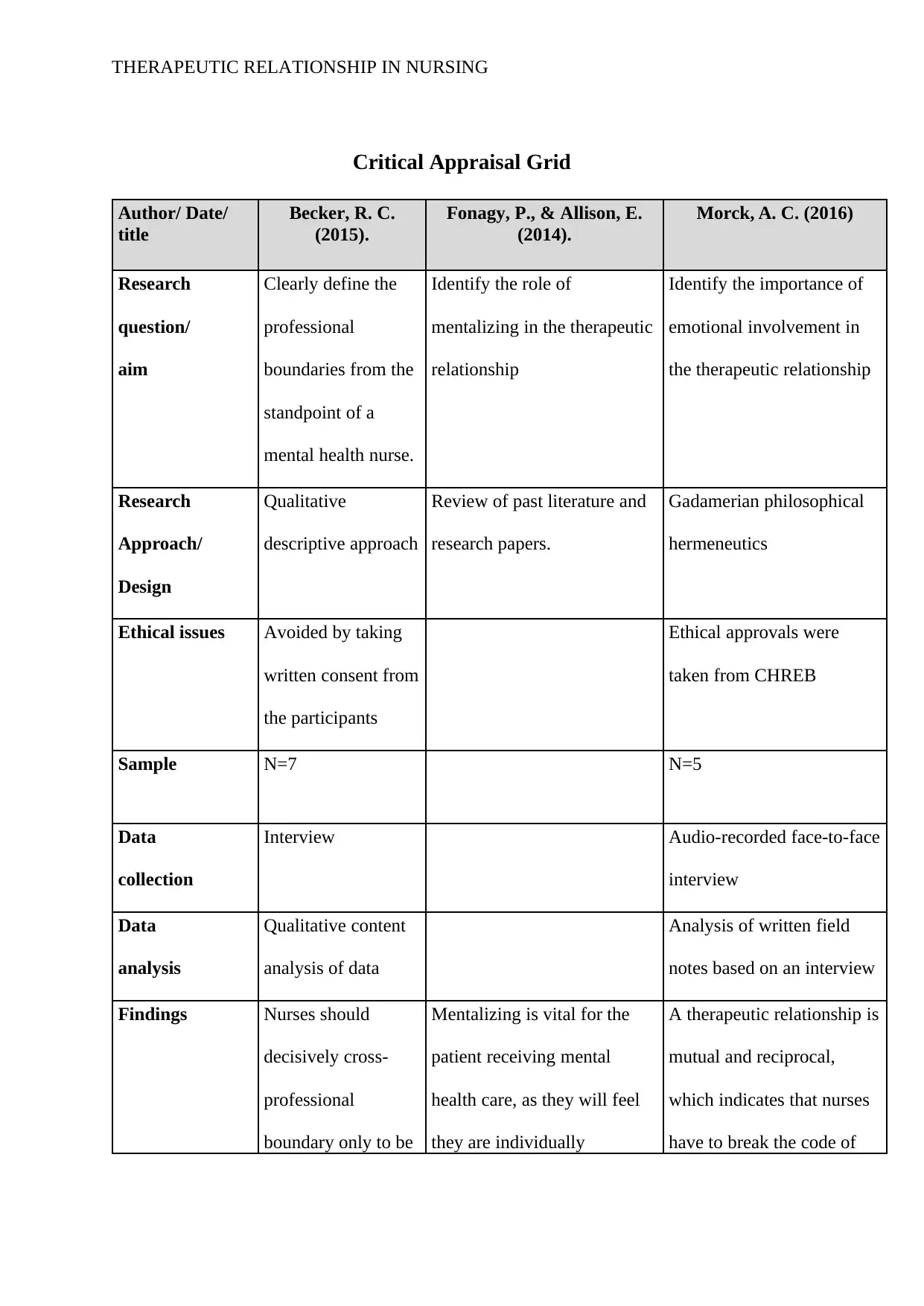
THERAPEUTIC RELATIONSHIP IN NURSING
Critical Appraisal Grid
Author/ Date/
title
Becker, R. C.
(2015).
Fonagy, P., & Allison, E.
(2014).
Morck, A. C. (2016)
Research
question/
aim
Clearly define the
professional
boundaries from the
standpoint of a
mental health nurse.
Identify the role of
mentalizing in the therapeutic
relationship
Identify the importance of
emotional involvement in
the therapeutic relationship
Research
Approach/
Design
Qualitative
descriptive approach
Review of past literature and
research papers.
Gadamerian philosophical
hermeneutics
Ethical issues Avoided by taking
written consent from
the participants
Ethical approvals were
taken from CHREB
Sample N=7 N=5
Data
collection
Interview Audio-recorded face-to-face
interview
Data
analysis
Qualitative content
analysis of data
Analysis of written field
notes based on an interview
Findings Nurses should
decisively cross-
professional
boundary only to be
Mentalizing is vital for the
patient receiving mental
health care, as they will feel
they are individually
A therapeutic relationship is
mutual and reciprocal,
which indicates that nurses
have to break the code of
Critical Appraisal Grid
Author/ Date/
title
Becker, R. C.
(2015).
Fonagy, P., & Allison, E.
(2014).
Morck, A. C. (2016)
Research
question/
aim
Clearly define the
professional
boundaries from the
standpoint of a
mental health nurse.
Identify the role of
mentalizing in the therapeutic
relationship
Identify the importance of
emotional involvement in
the therapeutic relationship
Research
Approach/
Design
Qualitative
descriptive approach
Review of past literature and
research papers.
Gadamerian philosophical
hermeneutics
Ethical issues Avoided by taking
written consent from
the participants
Ethical approvals were
taken from CHREB
Sample N=7 N=5
Data
collection
Interview Audio-recorded face-to-face
interview
Data
analysis
Qualitative content
analysis of data
Analysis of written field
notes based on an interview
Findings Nurses should
decisively cross-
professional
boundary only to be
Mentalizing is vital for the
patient receiving mental
health care, as they will feel
they are individually
A therapeutic relationship is
mutual and reciprocal,
which indicates that nurses
have to break the code of
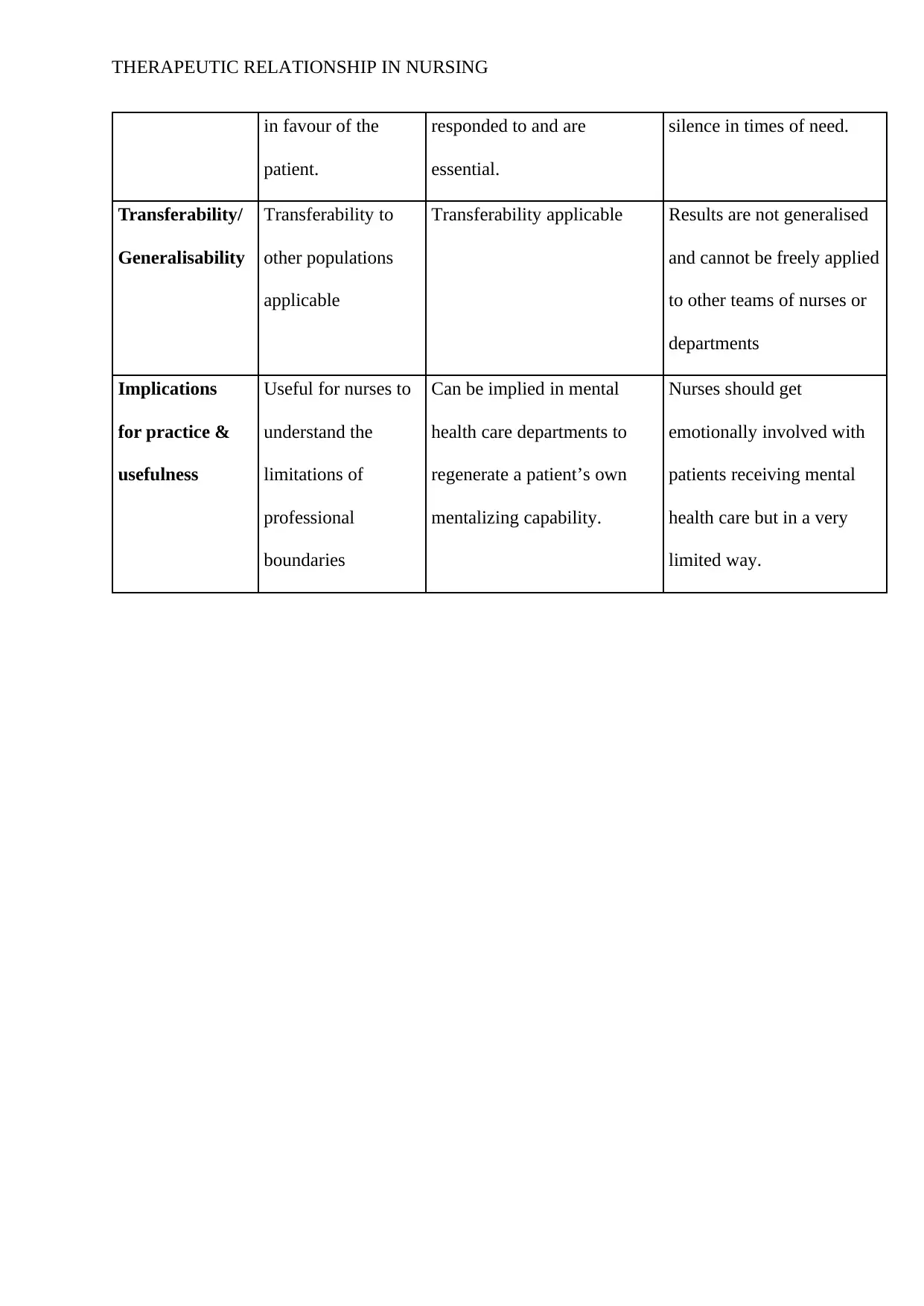
THERAPEUTIC RELATIONSHIP IN NURSING
in favour of the
patient.
responded to and are
essential.
silence in times of need.
Transferability/
Generalisability
Transferability to
other populations
applicable
Transferability applicable Results are not generalised
and cannot be freely applied
to other teams of nurses or
departments
Implications
for practice &
usefulness
Useful for nurses to
understand the
limitations of
professional
boundaries
Can be implied in mental
health care departments to
regenerate a patient’s own
mentalizing capability.
Nurses should get
emotionally involved with
patients receiving mental
health care but in a very
limited way.
in favour of the
patient.
responded to and are
essential.
silence in times of need.
Transferability/
Generalisability
Transferability to
other populations
applicable
Transferability applicable Results are not generalised
and cannot be freely applied
to other teams of nurses or
departments
Implications
for practice &
usefulness
Useful for nurses to
understand the
limitations of
professional
boundaries
Can be implied in mental
health care departments to
regenerate a patient’s own
mentalizing capability.
Nurses should get
emotionally involved with
patients receiving mental
health care but in a very
limited way.
1 out of 19
Related Documents
Your All-in-One AI-Powered Toolkit for Academic Success.
+13062052269
info@desklib.com
Available 24*7 on WhatsApp / Email
![[object Object]](/_next/static/media/star-bottom.7253800d.svg)
Unlock your academic potential
© 2024 | Zucol Services PVT LTD | All rights reserved.




